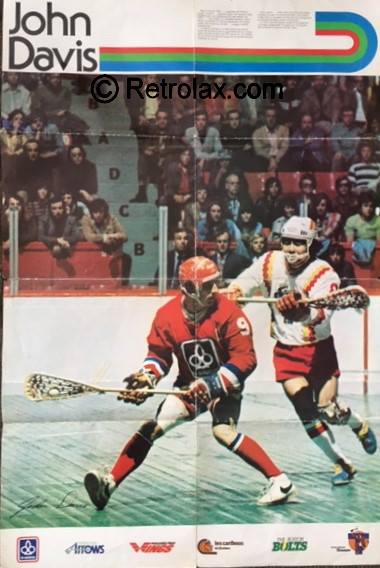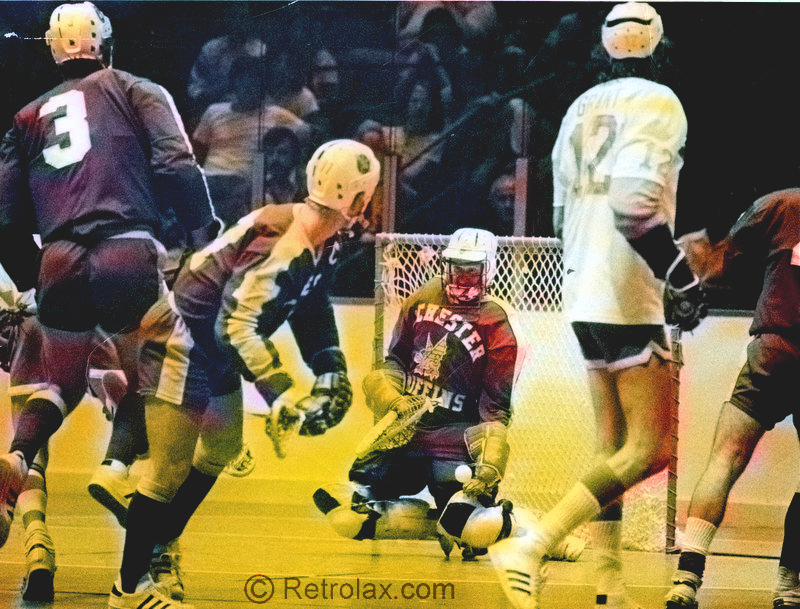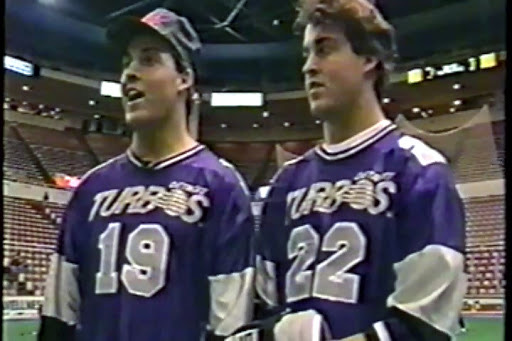1975 color game photos courtesy of Tom Wersderfer
“It’s better to have played and lost than to never have played at all.” Pat Differ.
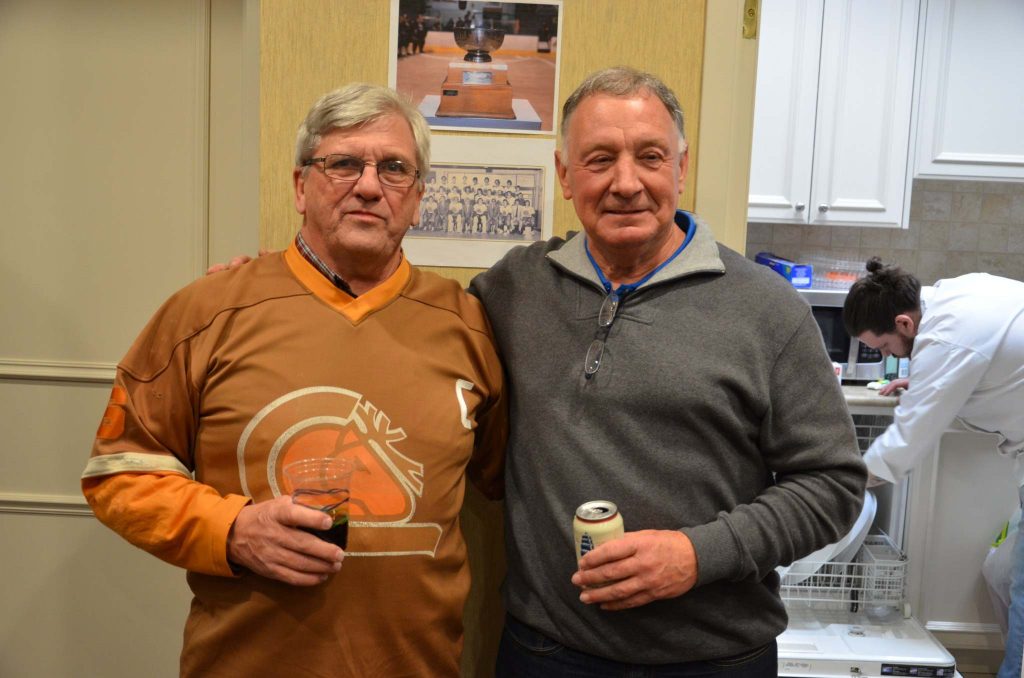
Jim Higgs(L) and Pat Differ
This is written, as you will no doubt, recognize in parts from my perspective as a Caribous player. As one who played before helmets, you must allow me some room to do a bit of descriptive stickhandling. A documented game or series history really does not exist regarding this time of significance in box lacrosse. I have tried to capture team feeling from talking to players from Boston, Montreal and Long Island as well as other Caribous.
For the record, crossecheck.com contains many items and stories from this time and other times in lacrosse. Dave Coleman’s dedication and deep commitment to the game, in partnership with Steve Holroyd , have created a place of excellence for fans to revisit these times in the game. Thank You Gentlemen!
Also need to say thank you to Tim Barrie, Dale MacKenzie and Larry Smeltzer and Duffy McCarthy for sharing their memories of our days together in this time of our lives.

1975… An Introduction
This group of the very best box lacrosse players in North America had finished a grueling 48 game schedule. Many had played close to 100 games in the two seasons, plus practices daily, when by comparison, a summer season in Canada would generally have just 24 games per season or so.
Those who are fortunate enough to find newspaper clippings from the “before internet” era, can gain some measure of understanding of the results of each game and series however, this story is from the horse’s mouth.
That is to say, from the players at the time in Boston, Long Island, Montreal and Quebec City. Emotions were high in the era of sport, when players did not like each other so much as they do today. Time heals wounds, scars remain.
This, of course, is also true of any sport in any era. One benefit from this aging process is that reunions occur, memories are stirred and looking back now, through this collection of thoughts and information readers get to visit this time in lacrosse history.
Maryland and Philadelphia missed this year’s playoff, just as Toronto and Syracuse had the year before. At the time, little did we know this 1975 season would be the last.
What is of particular importance in this case, at this time, is that the game of box lacrosse was in the very early stages evolution wise, of turning into the hybrid version of field/box played today.
The wooden stick era, hand crafted weapons, was beginning to give way to the moulded sticks of today, which when they appeared, gathered strange head turned crinkly eyed stares.
There was nothing pedestrian about running through the middle with or without the ball in those seasons. You were going to get whacked, crosschecked or attacked in some manner. Difficult to “write” an expression of violence with feeling for readers but, know that often a one-foot slash broke bones, and there was plenty of open flesh.
Rules were such, and stretched somewhat, in each referees eye to the point where players had to earn a penalty. Often times, the open fingered gloves were targets, and goaltenders who had played most of their careers wearing Yogi Berra masks, were forced to stop shots in gear that was in the truest sense of the term “padding” not protection.
Runners would use the Bakelite shells from the quad area of hockey pants taped on to their arms and quite frequently need to change them between periods because they would be shattered into pieces.
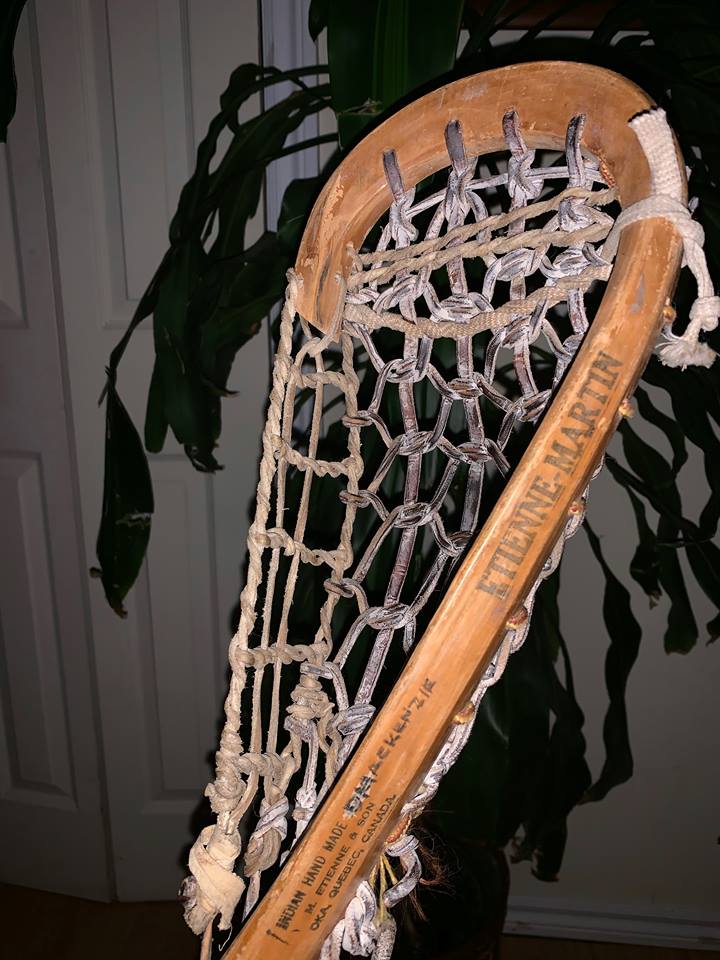
The hand-crafted, wood stick, swinging warriors from this 74/75 time in our game, were mostly products from Canadian summer leagues. Hot sweaty arenas, many players knowing each other in competition throughout minor and junior lacrosse. Without question this was a time when the game was a much more brutal version of the game today.
Split fingers, where usually the top hand on the shaft of an offensive ball carriers stick, with open fingers from the cut-out palms, became targets. When a finger is pressed tightly up against the hickory shaft and a slash with some force, intended or not, comes down on top of the nail, there is an immediate feeling of intense pain. If the receiver is fortunate enough to have the nail split to release the blood, then just soreness is the result.
Regularly the case would be that the impact would just cause the pain and then swelling, followed by building pressure which would be felt with each heartbeat. This would continue until the unshaven trainer would rush you into the trainers table and heat up a needle in an open flame, then the needle would be pressed point first into the nail and spun like a drill until it burned through the nail, releasing the built up blood, shooting straight up and often hitting the light fixture above the table. Immediate relief, a bandage and back out there to even the score.
The two main league founders , Morley Kells and Jim Bishop, had collaborated on previous professional league attempts in 1968, had an Eastern Pro League in 69 and again in 72, and now the most complete league has been formed in 74 and 75.
Each time this was tried, the Ontario Lacrosse Association mainly and the Western Lacrosse Association franchises lost players to the pro league.
Attempts to establish teams in lacrosse hotbeds had failed and small town lacrosse in Brampton, Owen Sound, Peterborough, New Westminster, Victoria, and Coquitlam lost most of their best players making it difficult to compete or attract sponsors and crowds, so the air between the two was quite thick in the 70’s. This continued to be a problem after 1975, when many Ontario players went West when the OLA applied rules limiting former professional players per team. Many players played their last game of lacrosse in 1975.
1975 saw the National Lacrosse League regular season lines drawn quite clearly.
Long Island Tomahawks (Champion Rochester Griffins year before) were by far the best team in the league. Standings show them earning 62 points in the 48-game season, followed by Montreal with 48, and then Boston and Quebec at 46, Philadelphia Wings 44, and Maryland Arrows 42. This group of the last four were separated by just one win.
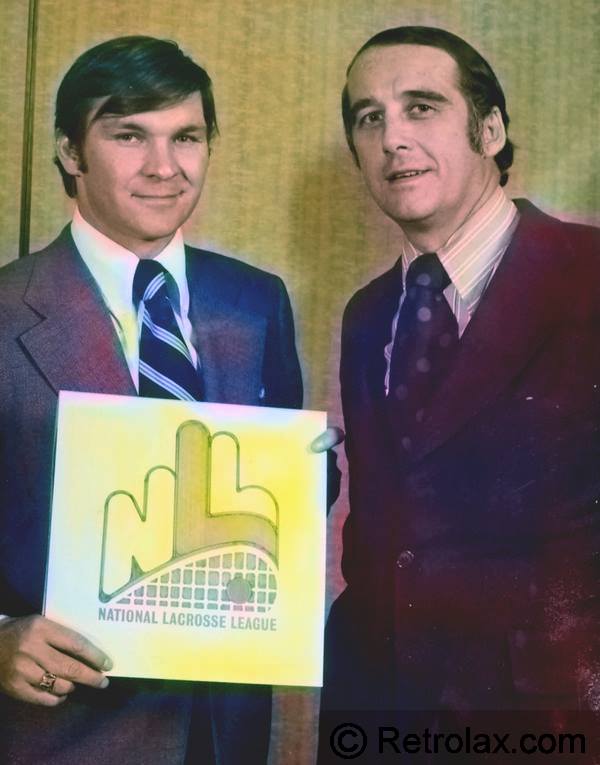
The stage was set Long Island vs Quebec City and Montreal vs Boston best of 7.
During the ’75 season, all teams had ups and downs even Long Island, who after 33 games were tied with Montreal for top spot with 40 pts each, after starting poorly and being in last place with a 2 win- 5 loss record out of the gate.
Remarkably there were many one goal or overtime games with home floor being an advantage for every team in the unbalanced schedule. Quebec, for example, played Boston 12 times but had only 8 games against Long Island. Long Island won 9 of the 10 games they played against Montreal. Team match ups were very interesting.
Reviewing team statistics, club vs club, it is clear, that come playoff time, although Long Island was the clear favourite, you could throw a blanket over the rest.
The match up between the Tomahawks and Caribous over the eight regular season games show Long Island won 5 of 8 games, outscoring les Caribous 141 goals to 131 and in the other series Montreal vs Boston had Les Quebecois won 6 of 8 matches outscoring Montreal 117 to 103 so, over the eight games each, very close.
In the final Quebec City vs Montreal, les Quebecois won the season series of 10 games 6-4 outscoring les Caribous 131 to 120, close as well.
Series A: Long Island Tomahawks (31-17, 62 pts.) vs Quebec Caribous (22-24-2, 44 pts.)

Nassau Coliseum, Uniondale, Long Island
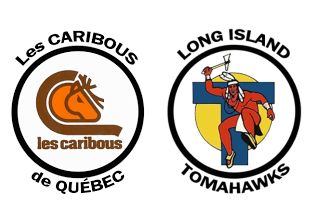
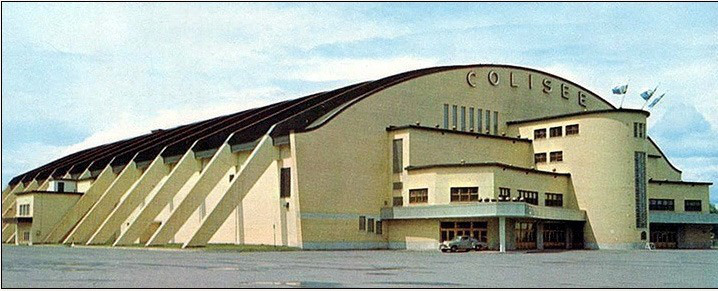
Quebec Coliseum, Quebec City
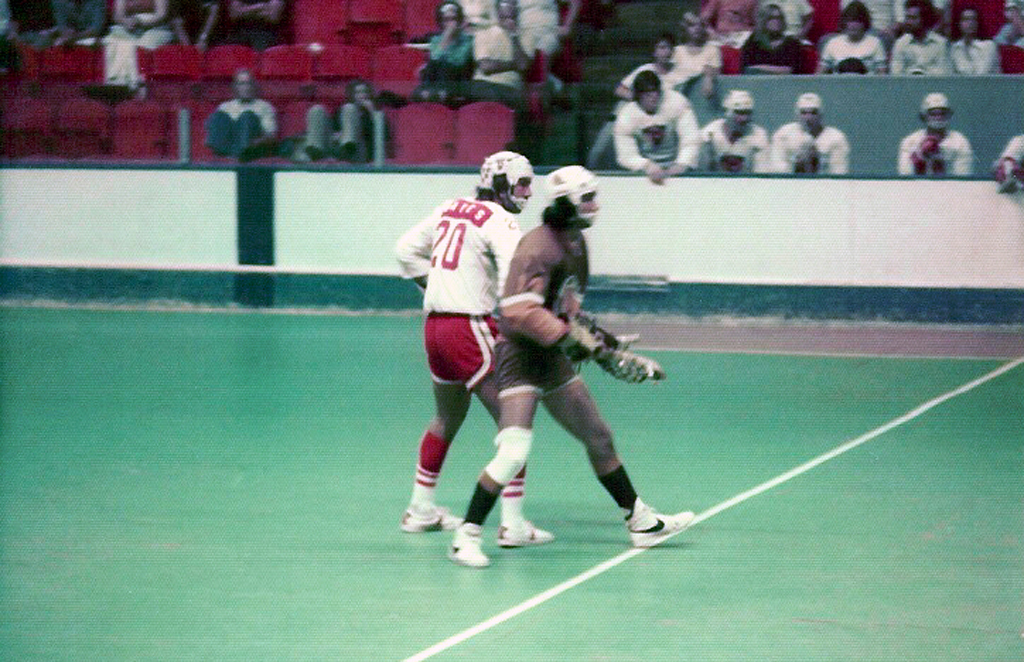
#20 Doug Hayes
Here we go, first two games on Long Island and the Caribous were ready for playoff action, having quite a different look and feel from the core group of Syracuse Stingers, who had missed the playoffs year before. We had testy battles with these guys all season.
In sport, playoffs or one game finals, team vs team logic takes on an entirely different mindset and for other reasons, any upsets are not really upsets, as both are very good teams.
Of course fans and media establish the “favourites” based on season results and games between the two, but when a seven game series begins, it is all about preparation and execution, being ready, knowing how to play, a total team environment and of course momentum and handling adversity as a group.
Quebec, as any team does, had its characters, had scorers, defenders, tough guys and GREAT goaltending. We went into this round with players, coach and a strategy that would target Long Island and get in the way of how they liked to play their game.
Coach Morley Kells had won everywhere he went in his career and was defending his NLL Championship from the year before with the Griffins.
He had added some key pieces, to the 74 line up, biggest (literally) was 6’4” 235 lb freight train Doug Hayes from the Vancouver Burrards of the Western Lacrosse Association. Hayes had pretty much run over the league in 75 winning the scoring championship with 104 goals and 126 assists for 230 points in 48 games.
This bunch was a run and gun group with nine 100 point scorers, during the season. As a team, they scored 802 goals compared to our 729. On the other hand we had allowed 694 compared to their 702, so it was closer on the surface.
As always, many factors in a series, health, confidence levels and momentum all play a certain part in a seven-game series.
Long Island had also added J.J Johnston, Al Lewthwaite and Chuck Medhurst to their Championship team from the year before, all big contributors to the season’s success.
Quebec literally made the playoffs on the last game of the season, after Philadelphia lost to Long Island in their last of 8 losses in a row, tumbling out of the playoffs which must not have been fun.
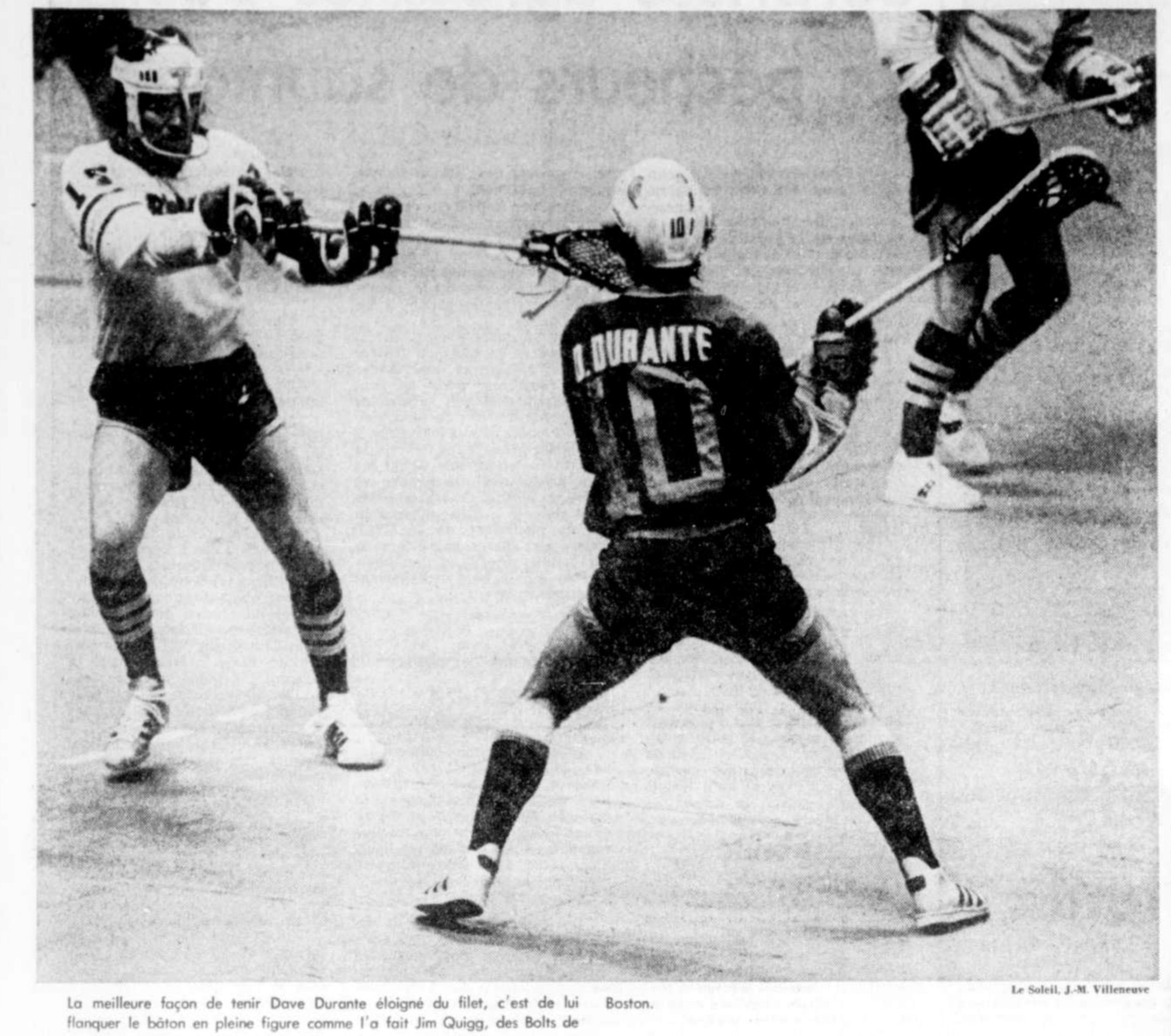
Dave Durante
The Caribous had been busy rebuilding from a disappointing Syracuse season in 74. This began with the 1975 Draft where Quebec had the first pick, by virtue of the last place finish in Syracuse. By this time Chris Rudge, (a player in Syracuse), had been transformed (thankfully) into the G.M, Director of Player Personnel. Rudgie had this unique ability to adapt, learned quickly to parle-vous the ding dong and settled into his new digs.
Chris called me to ask about our first pick, as the consensus was that it was between New Westminster Salmonbellies Al Lewthwaite, a big strong powerful lacrosse presence who could do it all. Fight, score and be a dominating player on the floor, and Coquitlam Adanac speedy offensively skilled, goal scoring playmaker, Dave Durante.
I had played in the Western Lacrosse Association in 1973 with the Vancouver Burrards, knew of or played with most of the players including Doug Hayes, Lewthwaite and Durante.
Chris asked me a direct question “You played out West, you know these guys. I’ve never seen either of them, who would you take first pick Lewthwaite or Durante?”
My answer was quick and confident “Take Durante 10 times out of 10!” I said.
“You sure?” Chris said. I went on to explain my reasoning in that WE needed Durante more than Lewthwaite on OUR team and Chris said OK!
That choice turned out to be a good one, as Durante ended up being our best scorer that season, 5th in league scoring and making the All Star team. We had lost our gunner Paul Cioci to a knee injury for the season. Zeke was a 2 goal a game guy in 74 and we needed to replace that.
Along with additions through trades and the draft, we added Brian Evans who looked innocent enough on the floor but would end up being one of the greatest scorers of his time in the game.
Murray Cawker, a big thoroughbred surprisingly gifted player, Gord Osinchuk fast fisted boxer, full of grit and a strong dressing room presence who held teammates to account, Jim Gow from the Peterborough player machine, steady defensive not flashy dependable always there point a game guy. Ozzie and Gow had come mid season in a trade with Montreal for the Marvelous Mohawk Gaylord Powless, who in 1974, had his last great year after being the very best in the game when playing in Oshawa, Detroit, Brantford, Coquitlam and Syracuse.
Brian Wilson, a gifted, speedy scorer and Rick Bisson one of the toughest, biggest-hearted players of the day, never took a shift off came to us from Long Island for Bruce Todman and Art Seekamp and made us complete when added to our core of playoff hungry players. Both Wilson and Bisson had played for Morley in Rochester in 74 and won.
In our room we would strategize and use what we knew, as going into this series we were anything but overconfident.
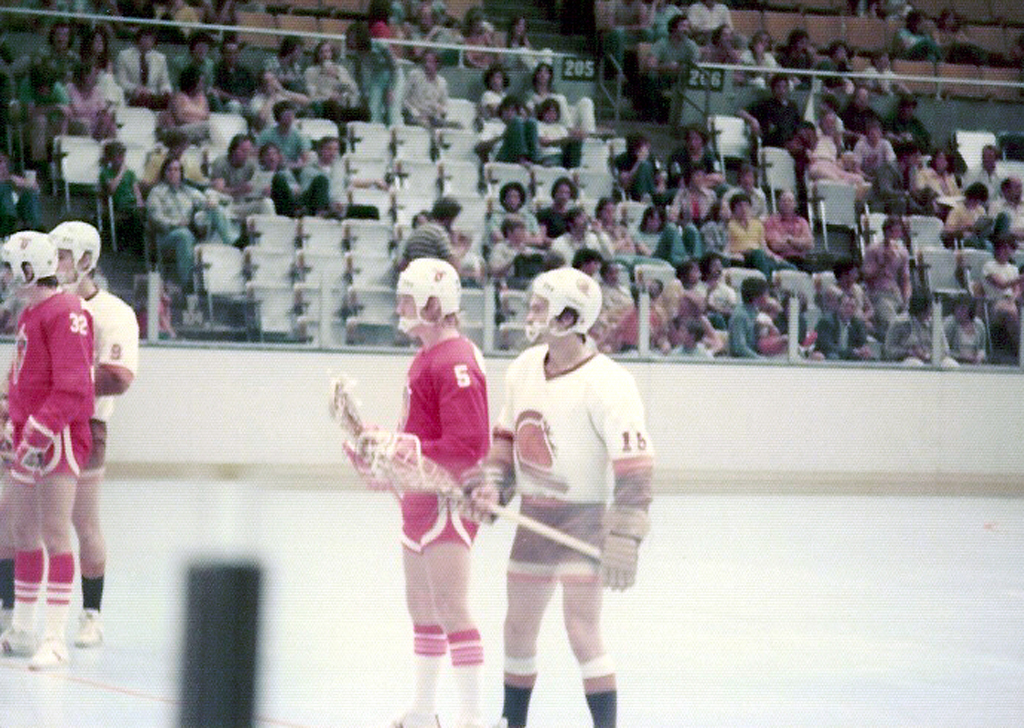
Game 1: September 3rd, 1975 on Long Island
We lost the opener, in what pundits would describe as typical or predictable fashion, 19-13 with the Tomahawks running and gunning their way to the win as was their norm.
The first game was somewhat unconventional in that the Long Island goal scoring was not led by Hayes, Lewthwaite or Grieves, their top scorers.
As was mentioned they had many snipers and in the first game, J.J. Johnston who actually played the game without seeming to run at all, scored 4 goals in his deceptive, somehow hard to hit manner and stick wizardry, followed by big Chuck Medhurst getting three.
Big Al Lewthwaite scored the winner and Chris Rudge may have wondered about our first pick in that 75 draft. We had to slow these guys down. Had to come up with a better game plan. All players were a bit beat up playing so many games, normal seasons historically would contain between 20 and 28 games for the most part over a summer.
The fact that Long Island won the first game as expected and by 6 goals, made Les Caribous look in the mirror. The team leader, who we all looked to for inspiration, Jim Higgs, had been through many lacrosse and hockey wars being a two-sport athlete.
Cornell Big Red hockey in college, American Hockey League and Captain of the Oshawa Green Gaels Minto Cup Dynasty, he had been on 6 of the 7 consecutive Canadian Junior A Championships 63-69, and had that look on his face and in his eyes. He was our soul.
This was a different time for our team. This was an opportunity to stand up in the series, if we had the courage. No doubt, that with the room full of championship character, Minto’s, Mann Cups, game 7 experiences all round we needed NOW, to show what we were made of and had the tools to do it. We needed to and did realize the challenge.
Trades made in season had brought I believe “the difference makers” to our roster, along with the skills of Cawker, Evans and Durante we were facing a situation we needed to rise up to take on, and in sport that is a stark reality. Osinchuk, was a key. Success wise, our core group had been through two seasons of mediocrity really, and now were on the playoff stage.
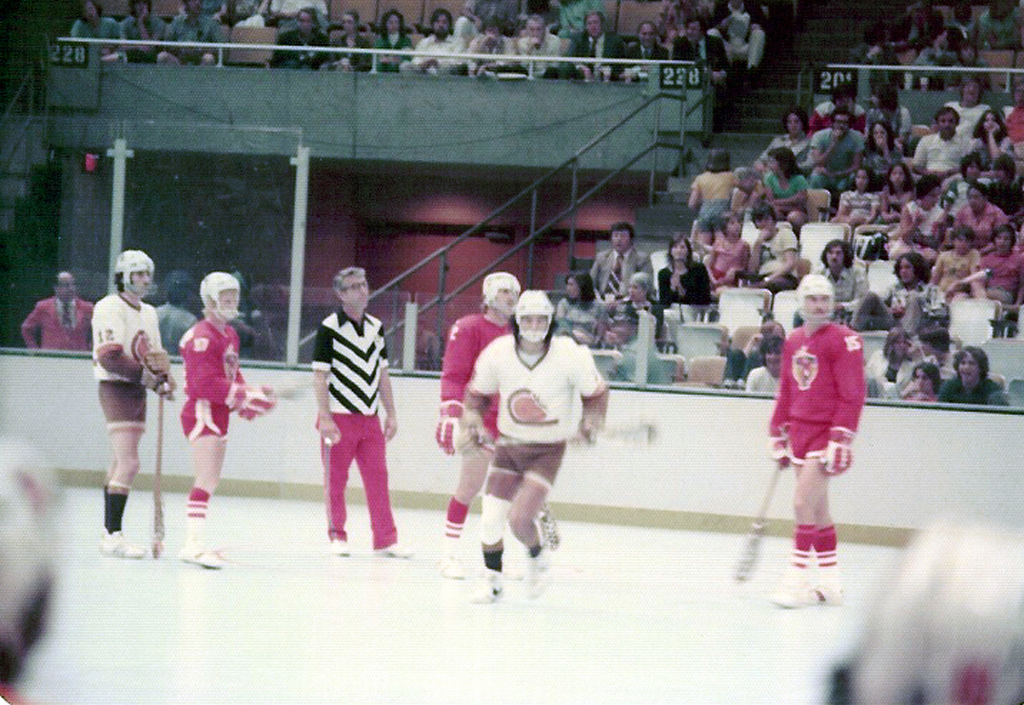
In the other room, Long Island were defending champs from Rochester. Same core group who were better too with the additions of Hayes, Johnston, Medhurst and Lewthwaite among others. Run away season leaders playing a team that barely squeaked into the playoffs.
Not to say that overconfidence was a factor in the Long Island room at all, but rather a sense of tired confidence, tired of workouts, tired of the pressure to win.
Any team that wins a championship knows how difficult it is to repeat, to keep the mojo going moral wise. Things can fester on a team.
Quebec experienced the “fester of losing” the year before and a sort of funk about breaking out. Long Island was not there. They won the first game handily and were in their minds on their way …again. These things can turn quickly.
On the Caribous side, grit turned out to be what emerged from our blend of players.
Steady leader co-captain Ken Alexander, Osinchuk, Wilson, Bisson, Terry Sanderson, who became a lacrosse legend, Glen Mueller, a big strong Yank, defensive talent who also scored goals emerged as the best of the American players, Russ George, a late round draft pick in 74, who was the cornerstone of fear in our defense, all played vital rolls in this playoff run.
Cawker, Evans, Durante and big gunner Travis Cook, who had the heaviest shot in the entire league, began to find the corners and not put so many holes in the boards in this series, led us with 13 goals.
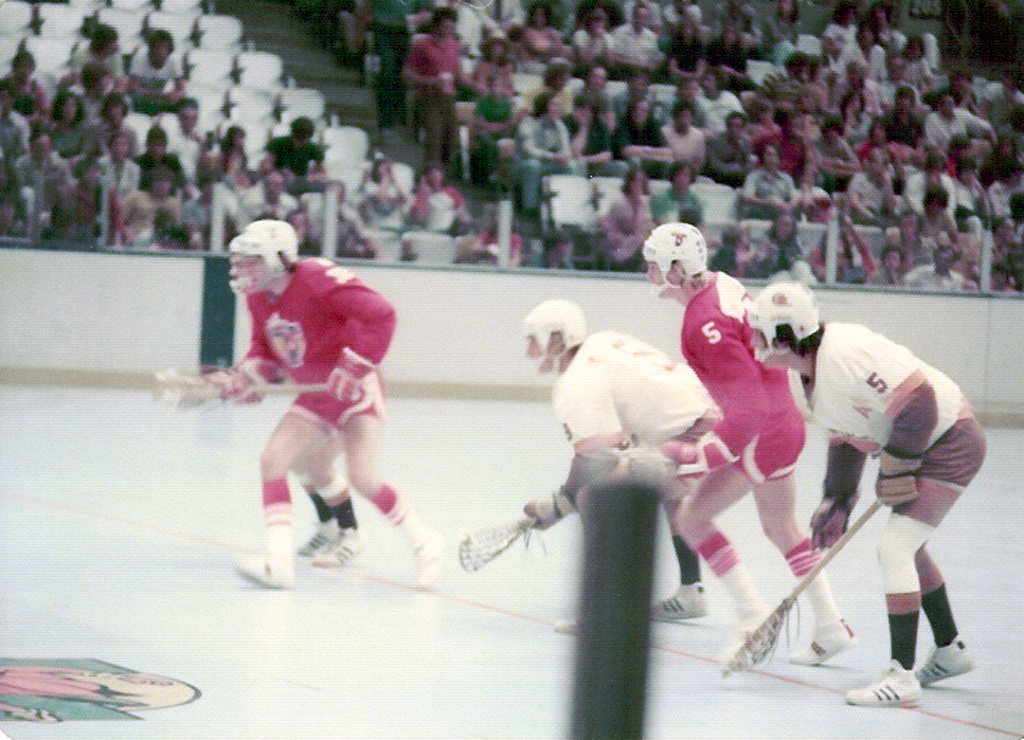
Game 2: September 5th, 1975 – Long Island
We called a team meeting which really lasted for a couple of days, as we were immersed in our thoughts of how best to play these guys?
We were tough as nails and mean on defense, but we needed to make some adjustments. During the playoffs, this is really the part of the game we needed to play smarter. Larry Smeltzer in goal stood on his head many nights. The tandem of Smeltzer and Rick Palla were our backbone.
Both goaltenders worked in unison during the season, offensively gifted they could and were the start of many fast breaks firing the ball to a breaking forward after stopping a shot. Palla was a Toronto area Lakeshore boy, who always stood out intensity wise. We would have won nothing without them.
Playing in the WLA knowing many of the new players in 75 was really helpful in a series. In our meeting, Doug Hayes I said, was a Clydesdale in motion, often he would score with one or two guys hanging off him. When he had an eye on the net he seldom varied from his routine and would score 4, 5 or 6 times a game.
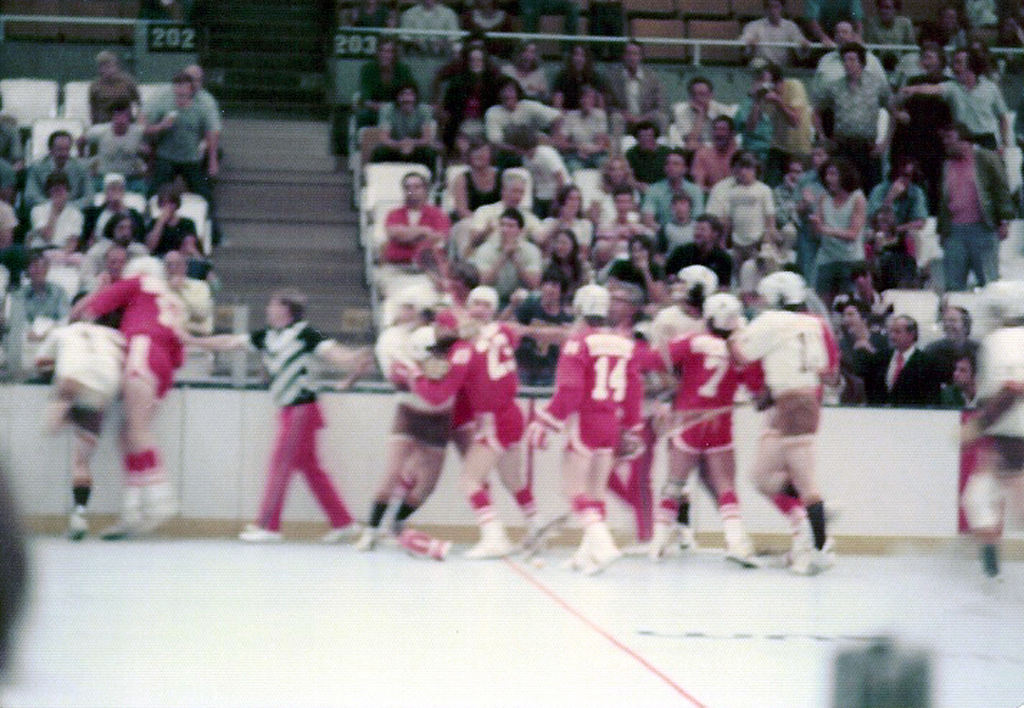
Double or triple teaming him would allow him the option to dish off to an open shooter and in Long Island there were many snipers who could really score.
Gifted J.J. Johnston, sneaky Dave Wilfong, Charley Henderson who seemed to run on air, Ted Greves powerful and tough, Jan Magee what a shooter, flick of his wrists and top corner, Lewthwaite and silky smooth Al Gordaneer were big time goal scorers given the chance.
What if? I continued, what if we let him have get his 4 or 5 goals a game, cut off the other players on the floor on that line. IF we were to stay tight on defensive man to man coverage and try to “tire” out Hayes by allowing him to have the ball, by allowing him to try too hard running for the net, each time down the floor, rendering linemates to be spectators, maybe…just maybe things would be different.
Let’s not allow them to play their game and try to make them play our game. Now, this was a mouthful we knew, but we agreed to give it a go. We needed to slow down the scoring from their side somehow.
Scoop up loose balls, control the game flow by slowing things down, using up the 30 second shooting clock. Let’s do all the little things, ball control, short shifts, stay out of the box. Play a more “technically” disciplined game, bear down on offense, things that always sounded good and like a winning recipe, but were in fact, hard to do unless the entire team bought in on this mission.
As game two began, Quebec was determined to play tight. This was a cliff-hanger of a game and there was a bit of ropa-dope on our part. We forced or at least tried to direct the flow to what we thought about in our meeting. We were disciplined and seemed to frustrate Long Island players and coach.
Larry Smeltzer was magnificent, as Quebec was outshot 63-39, stopping 55 shots from pretty good shooters who were trying to go up 2 games to 0, but became frustrated. Smeltzer faced 21 shots in the 3rd period, as Long island turned up the pressure.
Doug Hayes was held to 2 goals of the 8 the Tomahawks scored in the 10-8 Caribous victory.
Travis Cook scored three times for Quebec, Jim Higgs twice, with Bruce Murdock setting up three. The series was tied, and WE HAD THAT LOOK IN OUR EYE, going home for two games. Holding Long Island to 8 goals had only been done twice in the 50 games played in 1975 as their average goal per game count was twice that.
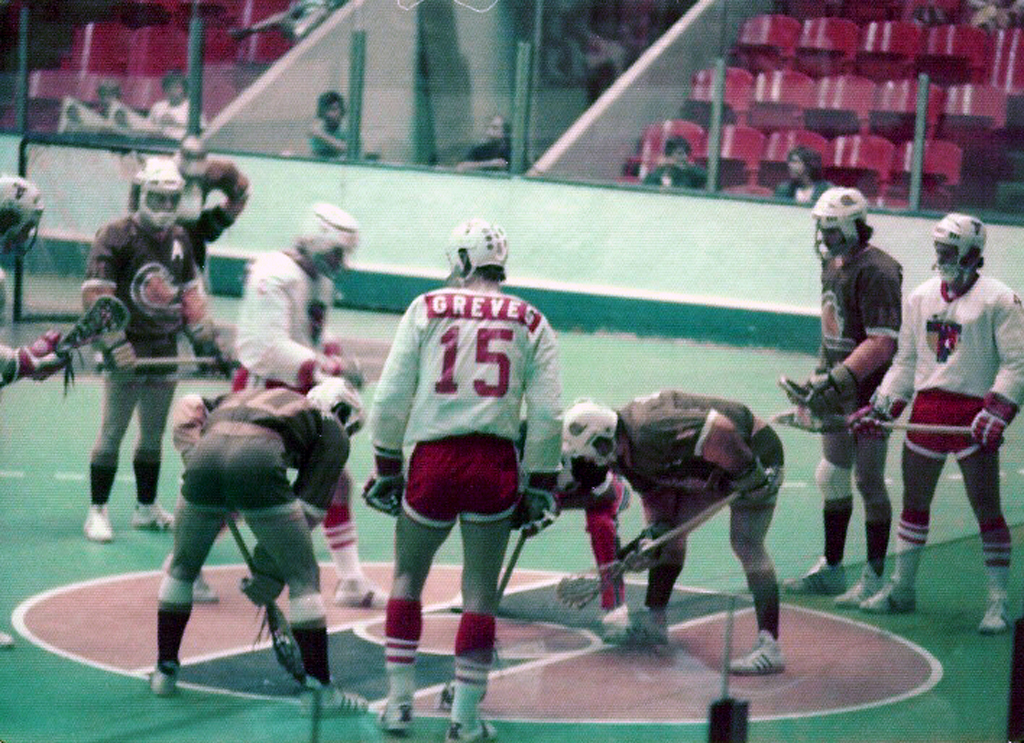
Game 3: September 9th, 1975 – Quebec City
In the four days between games, we practiced and felt loose and looked forward to what was to come, still not being totally confident.
In Long Island, there was a crack in their armour. Goaltending was in flux, as doubts crept into this tired group. There was blood in the water and Les Caribous tasted it.
After the Quebec win in critical game two, now facing two games in Quebec before a very vocal and appreciative crowd, it was not going to be any picnic for the regular season champions. A very hungry and motivated squad awaited. Something was different.
Les Caribous continued their committed game plan. Caribous coach Medo Martinello had many co-coaches, as we were all rowing together. We drew a strength from each other as a group.
Travis Cook in game three scored 4 goals to lead our effort. Brian Evans and Murray Cawker each had two goals in front of 5,350 loud fans. Again, we held Long Island to under 10 goals winning 14-9. No player scored more than once on Smeltzer. Crowd wise, it was probably the case of let’s look see how our team does in game 3.
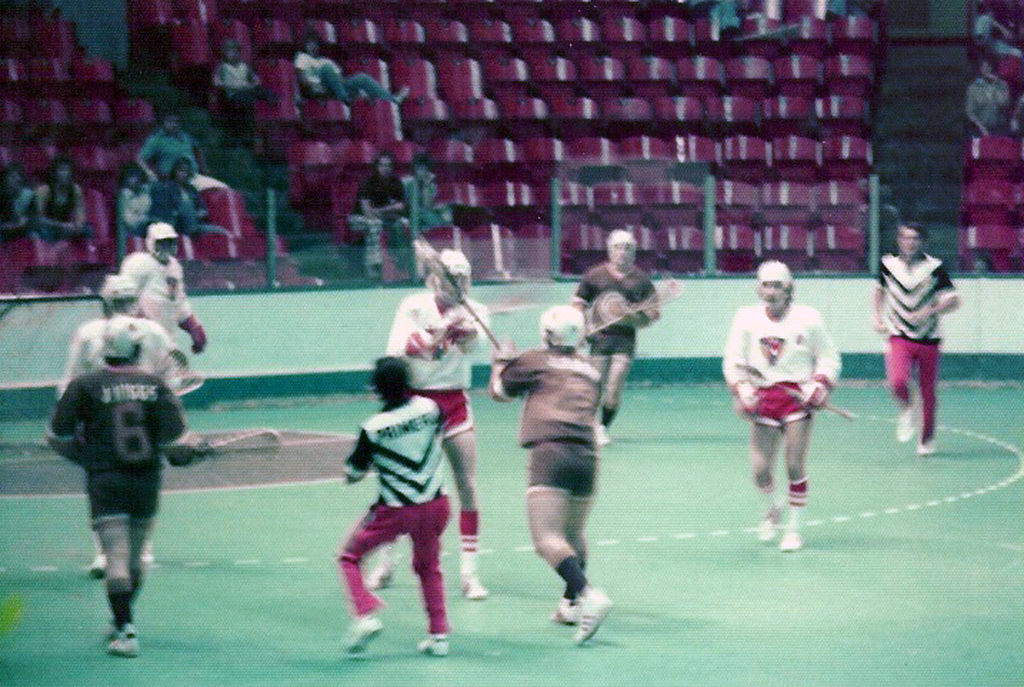
Game 4: September 11th, 1975 – Quebec City
This game was the key game in the series. Playing at home Quebec players knew the opportunity they had to really gain control in this series. The crowd did show up to nearly fill the Colisee.
Keeping the goals against down was key once again, doing our best to slow the pace, get back to defend and stay out of the box. A tall order against this Tomahawk team that must have felt pressure, as a first place and defending championship squad.
Jim Higgs and Dave Durante, our team leading scorer during the regular season with over 200 points, each scored 3 goals and added 3 assists in the Caribous 15-11 win in a game Quebec dominated before 6,684 fans at les Colisee which in the day seated only 10,500, before the NHL came in the house that “Beliveau” built.
Brian Wilson and tough Terry Sanderson scored two each and again Quebec kept Long Island scorers from any more than 2 goals each from Hayes, Greves and Lewthwaite as Long Island was outshot 61-54 and was now down 3 games to 1.
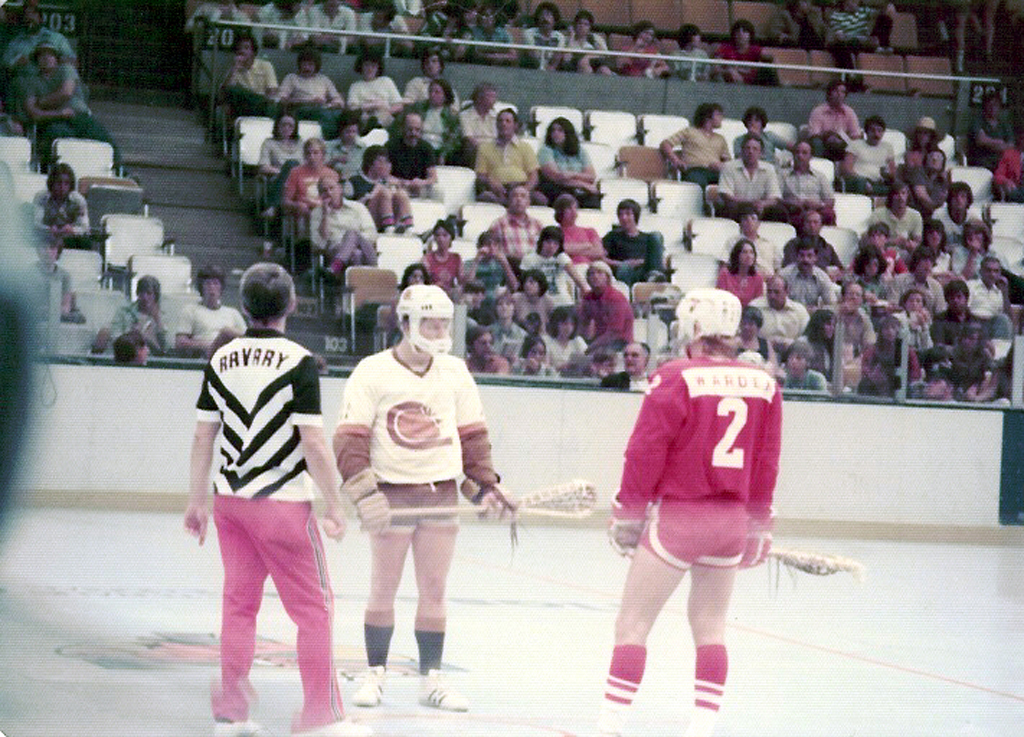
Game 5: September 12th, 1975 – Long Island
The very next night, we were back at it in New York, no time to rest.
Sport ebbs and flows, and in particular can be like that in a best of 7 series. Momentum had swung big time and Les Caribous were in control but, knew well we still had won nothing. Gut check time for Long Island. No matter what was going on in the dressing room, like us, each player from time to time needs to look in the mirror and feel this sense of urgency.
Happens in every series in every sport. We definitely had no reason or desire to swagger at all yet and were on the edge of our seats somewhat as we made the trip to New York.
Now, on the other side there was a determination and the fact to their surprise THEY were down 3-1 after winning the first game. This series had taken a turn.
In an instant, we learned that things can turn on a dime. A backs to the wall scenario allows one team another chance while in this case, for Long Island, win or it was over.
Game 5 resembled a regular season game. The Tomahawks were riding high on top of their game, and this was a stark reminder for Quebec, just how good this team was IF we let them have their game style.
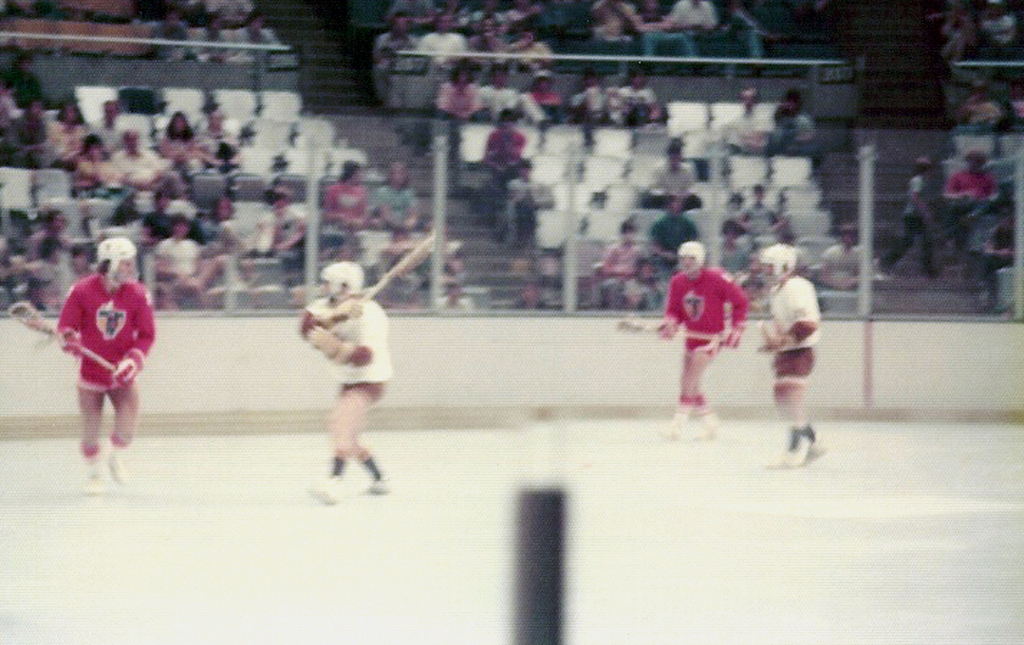
In any game, early breaks can create momentum, flow, and a hole to dig out of, with the resounding 20-10 Long Island victory our bubble had burst for the moment.
Greves broke out and scored 5 goals, Hayes adding 4 and Lewthwaite and Paul Murdock 3 each. Piling on as well in this lopsided game result were J.J. Johnston 2, Medhurst, Magee and Wilfong with one each. Series total goals for Hayes 16, Greves 12, and Lewthwaite 10 as top scorers with J.J scoring 9 goals in the series.
We did what all athletes and teams do in talking to our own inner being and as a team collectively “lose by one or by ten and it is still just a loss”, our goal was to let go and get ready for the next game in Quebec.
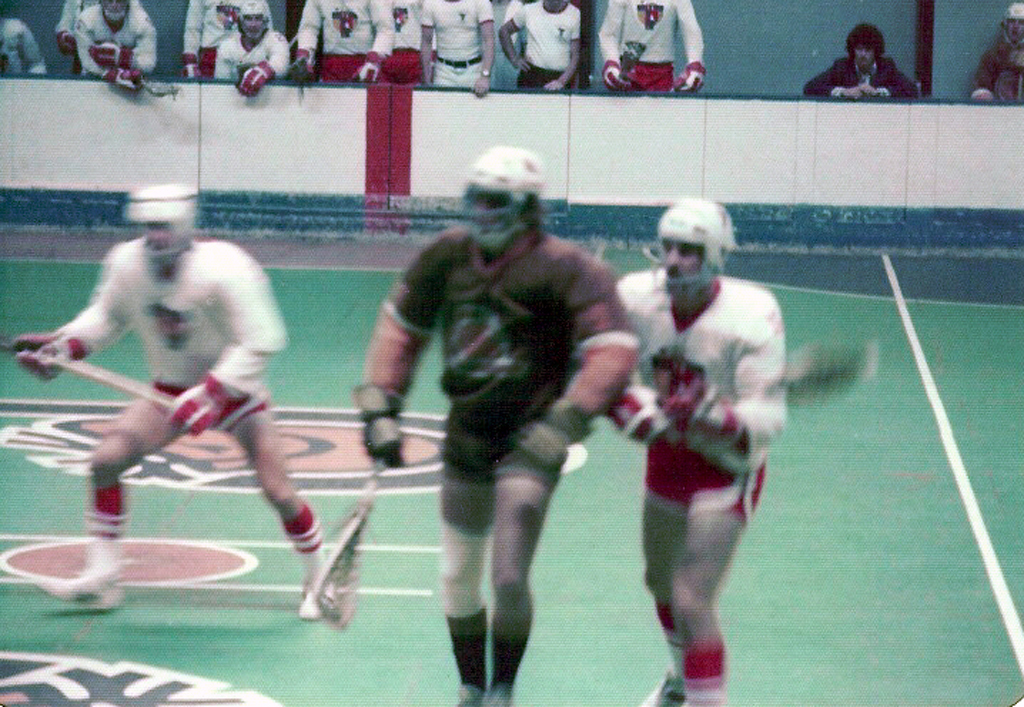
Game 6: September 14th, 1975 – Quebec City
This one had everything. The feel of a Heavyweight Championship Fight, the packed arena over 10,000 screaming and passionate lacrosse fans, who really had taken on les Caribous as their team, up 3-2, wanting to help their team take out the defending champions.
Quebec knew, ahead 3-2, as all teams do playing at home in a game six circumstance, not wanting to go away to play game 7, especially on the heels of our last game in New York.
Jim Miller and speedy Bruce Murdock rose up in this game to lead the way, scoring 3 goals each. Higgs, Cook, Durante, Sanderson two each and singles to Differ, Evans, Mueller and Quebec’s own Robert Bleau, who was a home grown favourite and played with grit.
Doug Hayes scored 5 goals, trying in vain to carry his team. Two each from Lewthwaite, Johnston and Greves and Paul Warden made the Tomahawk total 10, and when the dust settled, Les Caribous had scored 16, out scoring Long Island 5-1 in the third period, after ending two at 13-11 Quebec.
Now, earlier in the season Quebec fans were treated with something that must be mentioned.
This did happen, and really, could not be left out of this historical record between these two teams, which is now going to turn a bit funny and just may explain some of the emotion in the Long Island dressing room and in the “air” on the other side of the floor.
Quebec fans no doubt remember the night that the Long Island coach Kells, ahh….crossed the line, sort of, the events of that night follow and in part, added an amount of joy to the Caribous fans celebration and excitement.
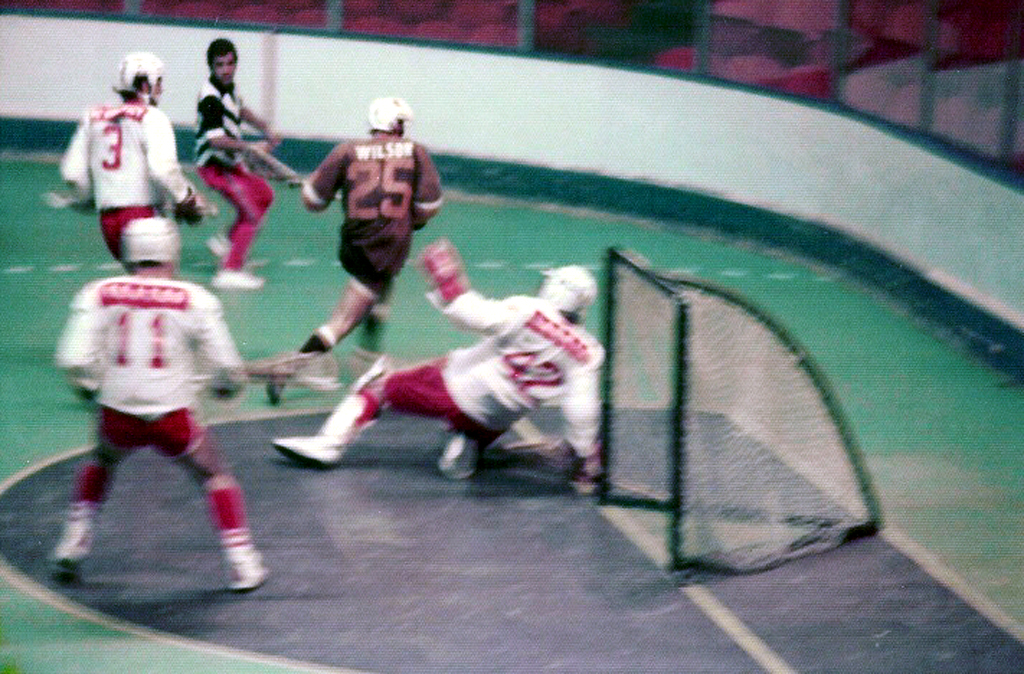
Dressing rooms in those days in the Colisee were on opposite sides of the rink as the players benches were. Immediately across the floor from our bench, was the penalty box and to the left of that was the visitors’ bench.
Between the second and third period there was a custom in Quebec to present someone something on the floor as the teams waited to begin.
We knew nothing about a presentation that was planned, as both teams really did not understand the French speaking announcer who was about to introduce a fan from the crowd, to the delight of all Quebec fans as the “most popular’ or “most faithful, dedicated fan.”
A small trophy was to be presented on the floor immediately in front of the penalty box, which as I described was right beside the Visitor bench on the same side of the floor. Very close proximity.
Intense, short sleeve and tie Tomahawk coach, Morley Kells, had not been happy with the referees all night. Quebec had pretty much held the lead the entire game, frustrating Kells who stood watching and wondering like the rest of us Anglos what the ##!!^!! was going on?
Morley had no doubt given his troops the Knute Rockne between periods and had them primed to come out charging now had to wait while this ceremony was taking place right beside the Long Island bench.
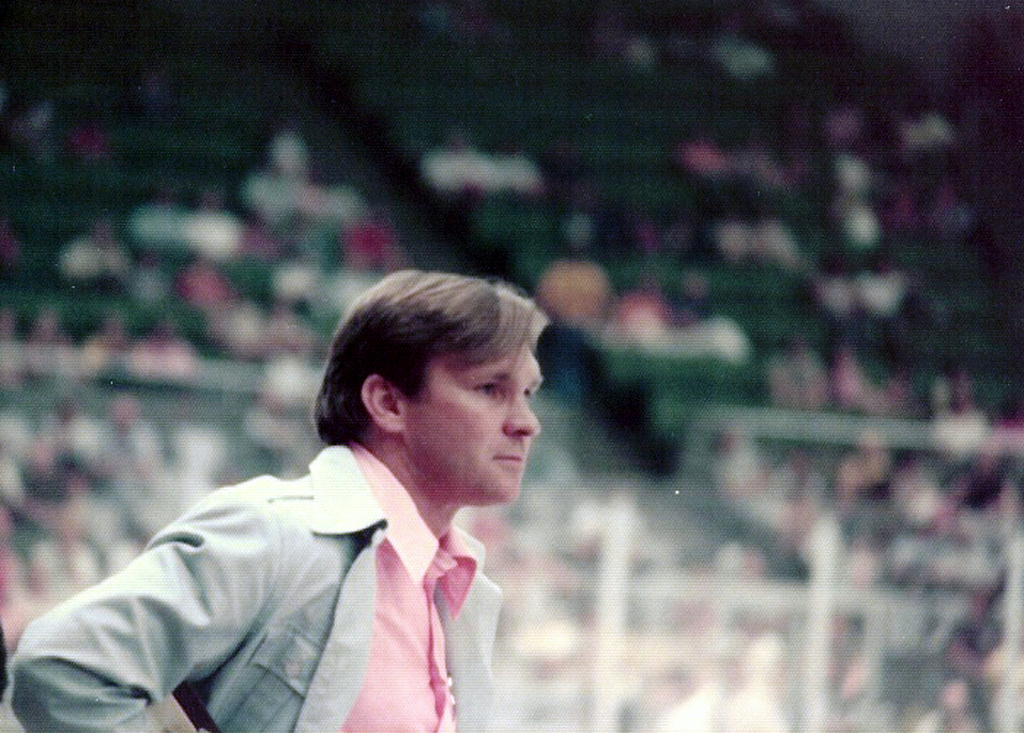
As the announcer went on, it didn’t really matter that we had no idea what was being said, down comes this fellow, in a T shirt, cigarettes rolled up in the left sleeve, big black beard and stomach almost as big. Cowboy boots and big smile, playing to the crowd cheers for this trophy presentation.
We sat and watched from our vantage position which was perfect to see what was about to unfold. Morley was actually standing on top of the boards hands on hips, yelling at the referees to start the game when…..
The fan, bless his heart, received the trophy, delighted fans roared and, this guy walks over to be directly in front of Morley, who by now has veins popping in his neck, smoke coming out of his ears. They make eye contact and the fan raises the trophy right in Morley’s face and wiggles it saying “Na..Na..Na…”, well……that was it.
Morley dove like Tarzan, a head first plunge right at the fan delivering a punch right in the kisser to this fan, and in shock the benches looked on as people went crazy, the Fan and Morley rolled around on the floor, blood everywhere, fighting until the officials could get them apart.
Hair ruffled, tie on sideways, bloodstained shirt, Morley was escorted back to his bench, the Fan was cleaned up, handed his broken trophy and to tumultuous cheers, escorted off the floor.
Our bench erupted in laughter, gloves covering our mouths trying not to show it. Long Island didn’t quite know what to do. Beat up, battered and defeated, their leader was taken out of the game, penalized for at the very least unsportsmanlike conduct and kind of lucky to not have ended up in the slammer.
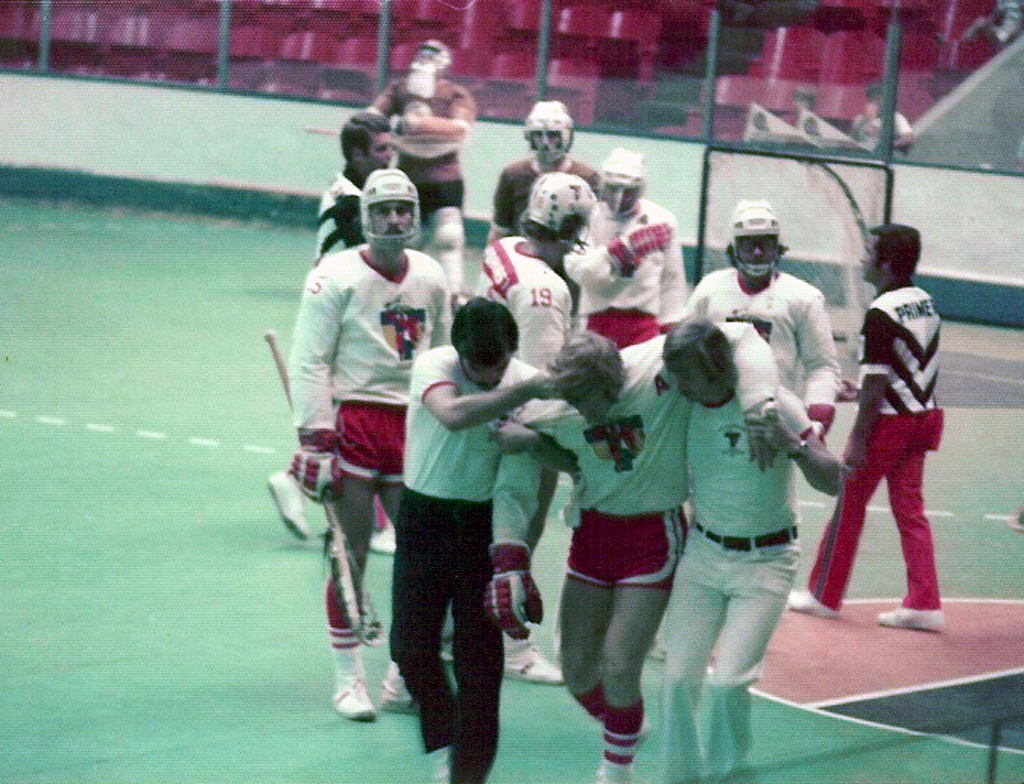
So now (back to the game at hand), as the third period was about to begin everyone in the building took some satisfaction knowing the home side was in control. Quebec scored 5 more times and Long Island could only muster one more goal and it was over.
An ending that none of us had seen coming to a series that pretty much had everything. Quebec was moving on to face either Boston or provincial rivals Montreal, which had never happened at a professional sport level.
The Montreal Canadiens and the Quebec Nordiques had not yet faced each other as it was NHL and WHA in those years and really the fans in the home of Beliveau and Lafleur were possibly about to face Montreal in a head to head final for the Championship of the National Lacrosse League.
Series B: Montreal Quebecois (24–24, 48 pts.) vs Boston Bolts (22-24-2, 46 pts.)

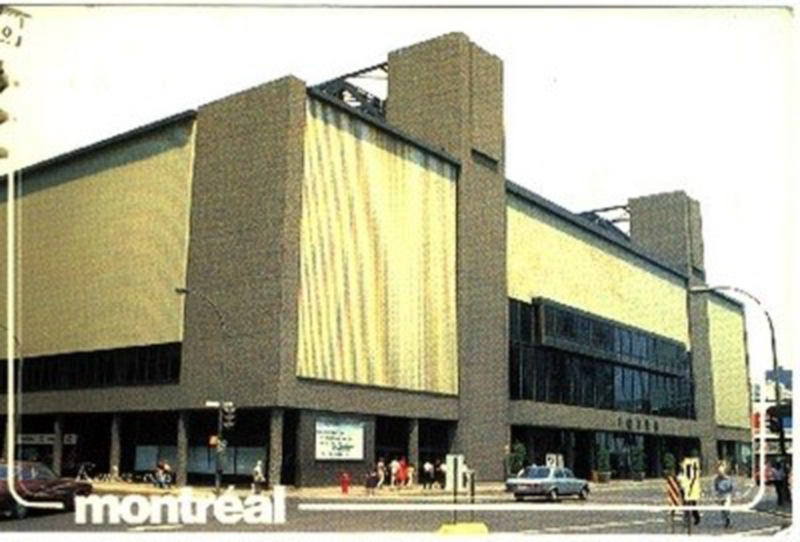
The Montreal Forum
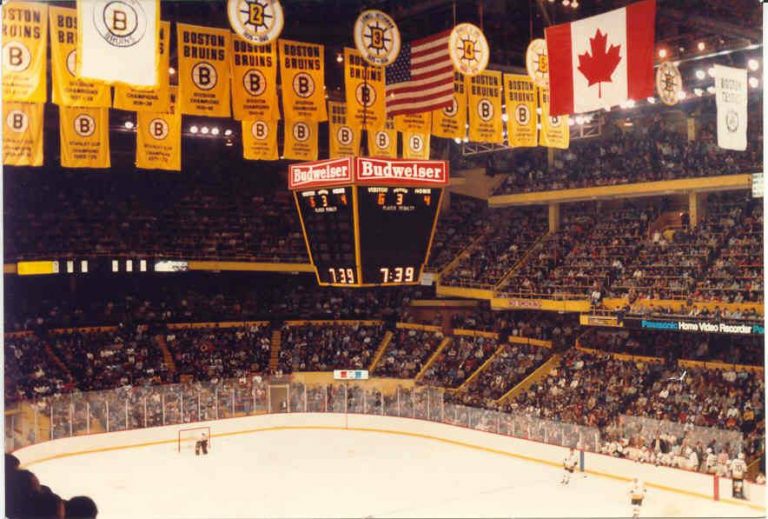
The Boston Garden
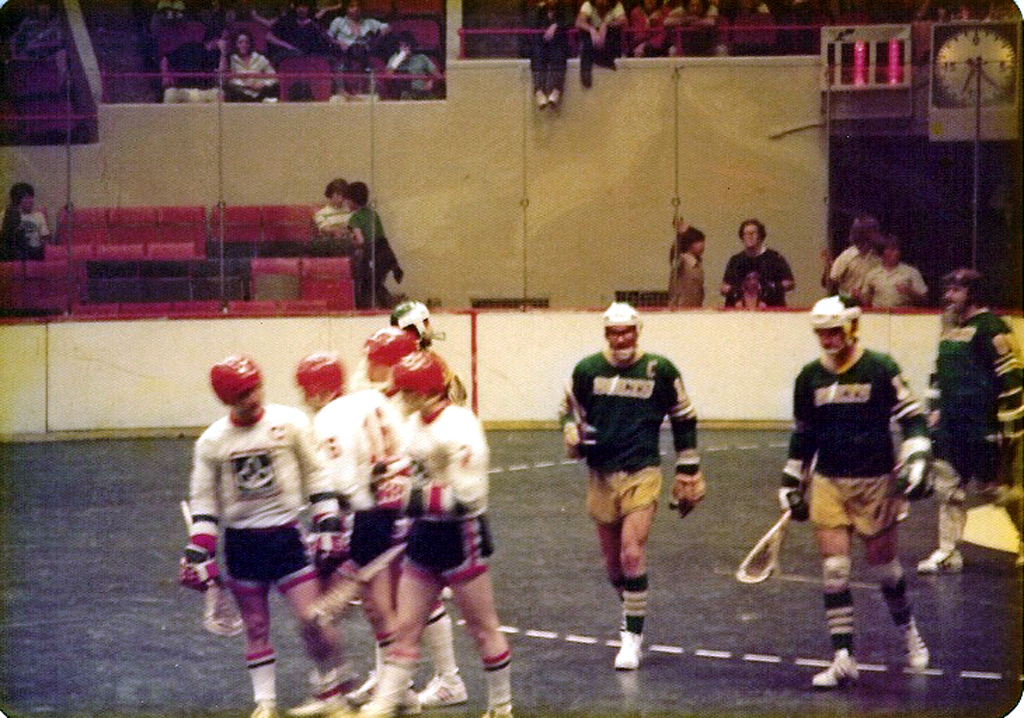
Season long battles between these two had been close, but Montreal held a clear edge in their eight game regular season contests (6-2), outscoring Boston in those games 117-103.
Overall, Montreal played a tighter style than Boston, both teams were well balanced in this series between two legendary rival cities. Montreal being the slight favourite based on the regular season record between teams.
All playoff teams kept an eye on the other series in the first round of the playoffs. Going into the playoff round Montreal drawing Boston had really happened because of Boston’s winning record over Quebec as both the Bolts and Les Caribous finished with the same number of points.
Fans in both cities in this series, would no doubt revel in playing any team from each others cities as the Bruins and Habs had a long standing animosity (putting it mildly) between the two.
A quirk in the schedule had the last regular season game between these two July 22nd, which was a resounding 18-7 win for Boston. September playoffs meant they had not faced each other for a while.
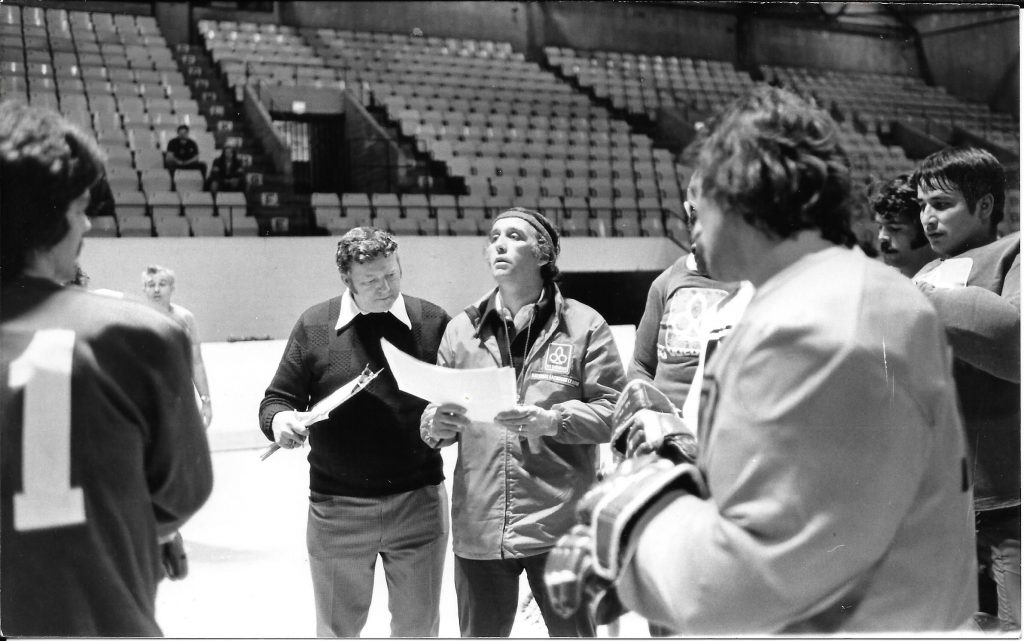
The year before, Boston was in Toronto as the Tomahawks and like Syracuse, had missed the playoffs so they were hungry going into this series playing out of the historic Boston Garden. Regular visits from Bruins were normal, as it was mostly Canadians in both sports. Many hockey players played lacrosse or at least known about lacrosse in Canada.
Montreal, on the other hand, had a rich history to follow in the Montreal Canadiens, playing in the Forum, with all those Stanley Cup banners hanging. Owner, and former Canadiens tough guy John Ferguson had said many times “it was a sin to lose in the Forum!” Himself a lacrosse player from Vancouver, he knew the game well.
Jim Bishop the legendary coach of Les Quebecois would have his team well prepared for this series, as would the Bolts coach Jim Logan who took over from Peterborough’s Larry Ferguson on July 6th and had an impressive winning percentage which was best in the league in his time coaching.

Montreal was led by the legend John Davis, who had been pretty much the best box lacrosse player in the world over the past 15 years or so. He was now in his early 30’s and really, I don’t know anyone who had taken more punishment in such a slight frame as Johnny did during his career but, he was always at the top of any league he played in scoring wise. A player who melted into crosschecks and who would actually use your check attempt to propel him forward. Just could not take the ball away from him easily.
Boston was led by Ivan Thompson who, on a side note, in one game I played in as a Junior A player against him when he played for Huntsville, scored 13 goals against us in one game. He was a force on the floor indeed. Big, strong and quick. One of a few guys who when you checked him, he would somehow knock you down!
Both teams were rounded out with strong offensive and defensive players as well as strong goaltending, as this league was made up of the very best players in the world at the time.
First two in this one were at the Forum in Montreal as Les Quebecois finished second during the tight regular season just two points ahead of Boston and Quebec.
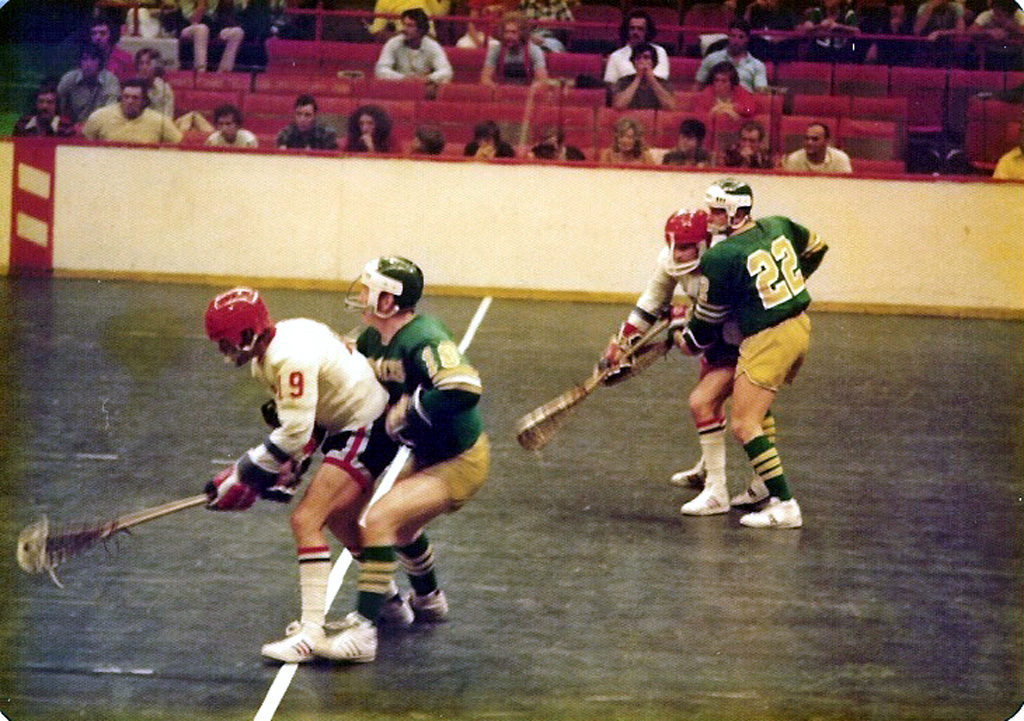
Game 1: September 2nd, 1975 – Montreal
Montreal came out ahead in this very close contest 9-8 as the scoring was evenly distributed on les Quebecois side with home grown Serge Loiselle scoring the winner. Vancouver’s Ron Pinder, a sneaky quick producer who played with a dirty edge and Peterborough’s Gord Floyd, a skilled scorer, netting two each. Bruce Roundpoint, a relatively rare US born field player in the league who when he got going was tough to stop, had 4 assists.
Boston had slick Joe McCrea with 3 and sniper Brian Davidson 2 lead the scoring. Simple shooter Johnny Allen and Ivan Thompson set up 3 each. After two periods it was tied 7-7 with Montreal outlasting Boston 2-1 in the third. Montreal outshot Boston 41-37 in this tightly played game.
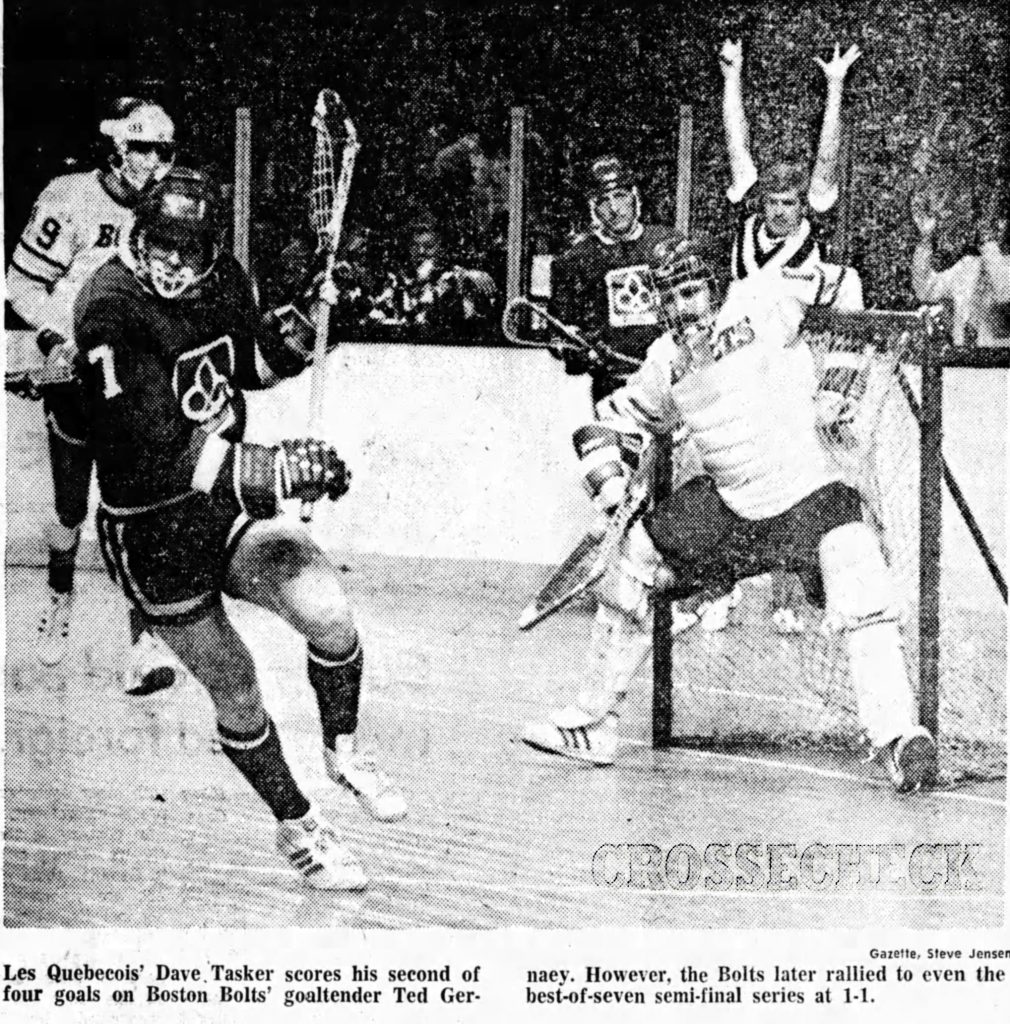
Game 2: September 4th, 1975 – Montreal
Boston won the second game 9-7 to even the series, after Montreal led 5-2 in the first period on the strength of Vancouver’s Dave Tasker’s 3 early goals. Tasker came from a three-brother family of players Al and Brian who played in Maryland, and all had different styles of play.
Ted Gernaey, the Boston goalie, was a standout in this game, as Montreal has four breakaways in the second period alone.
Ivan Thompson scored three, including the winner at 16:12 of the 3rd for the Bolts, who also hit eight posts during the game.
Boston coach Logan said “They beat us 3 out of 4 games in Boston, but we won the last one big, so we are looking forward to going home.” Boston scored 5 goals in the third period to pull away.
Also scoring for Montreal after Dave Tasker’s 4 goals in total was solid, steady, tough and always a factor Vancouver’s Dave Litzenberger, Bruce Arena of soccer fame, and Bill Squire, a Six Nations stalwart. Bolts scoring was rounded out by Brampton sniper Bram Wilfong 2, steady Dave Johnston, veteran Stan Cox, Larry Bell (Dinger) and Jerry McKenna with one each.
Crowd was 4.241 and saw Boston outshoot Montreal 46-44. One each after two, a lot like the other series.
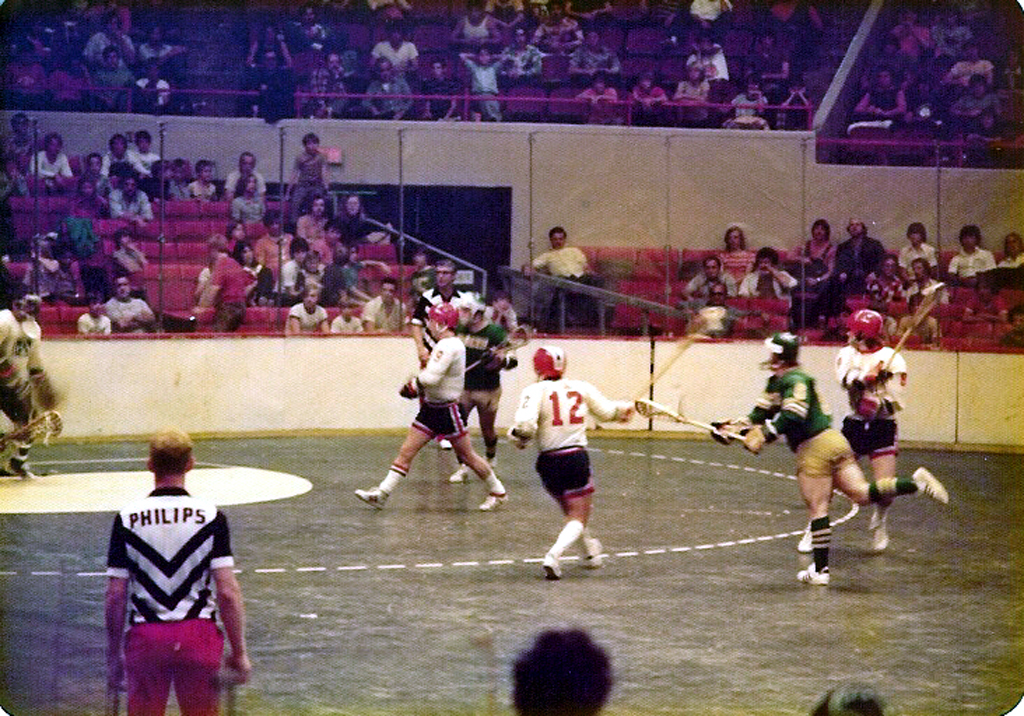
Game 3: September 6th, 1975 – Boston
Another close game result in this tilt, Boston took a 2-1 series lead after winning at home 16-14 in a more open high scoring contest, before 5,328 Saturday night fans.
Duffy McCarthy was a shifty highly skilled player, who could shoot from all angles, ran the power play and lead by example, scored 3 goals in the first period. In the third, Montreal pulled to within one goal only to see the Bolts score 4 times consecutively to close out the win.
There were 74 penalty minutes handed out. Boston took the lead on McCarthy’s first period heroics 8-5. Bram Wilfong scored 5 goals for Boston, with Larry Bell joining McCarthy netting 3 and Jim Quigg scoring the winner. Stan Cox earned 5 assists and Tim Havens set up 4.
Montreal was led by John Davis with 3 goals and 2 assists. Tasker, Squires and New West’s Ken Winzoski scored 2 each.
Boston out shot Montreal 61 to 41, with Dave Evans, Montreal goalie, having a strong game in the nets.
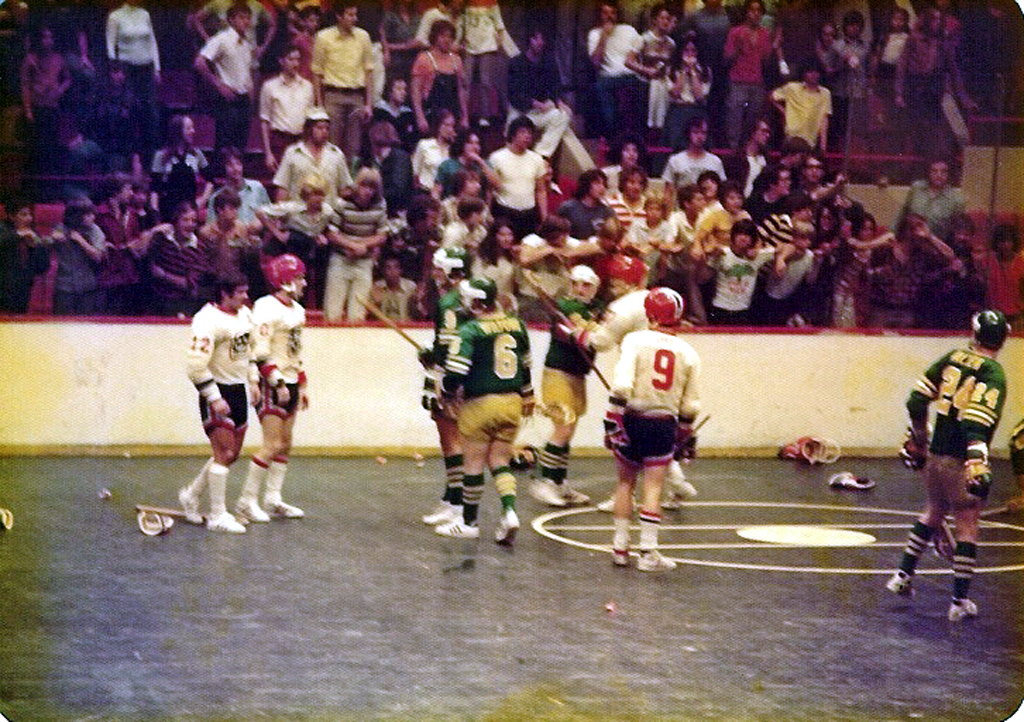
Game 4: September 8th, 1975 – Boston
Things get interesting in game 4, as pressure builds and home floor means something. In this game, Boston wins 17-14 to take a 3-1 series lead before 4.565 fans in the Garden.
The Bolts scored 7 goals in the second period. Ivan Thompson led the way with two goals and three assists for Boston with Joe McCrea adding a goal and four assists. Larry Bell had four points with 2 and 2. Chris Hall scoring the winner.
Gord Floyd led Montreal with four points and now the stage was set with Montreal being in a hole and going home.
Montreal coach Jim Bishop was incensed at Quebecois poor play going down 3-1 in the series and levelled his anger at goaltender Dave Evans. As Bishop left the room after his rant, Evans stood up and punched the concrete wall breaking his hand. He screamed in the recoil and it was obvious he was done. Mitchell took over in the nets and this was a rallying point around their outstanding goalie Evans. Bishop was informed that a shot had damaged the hand and the team stepped up to play at another level for the remainder of the series.
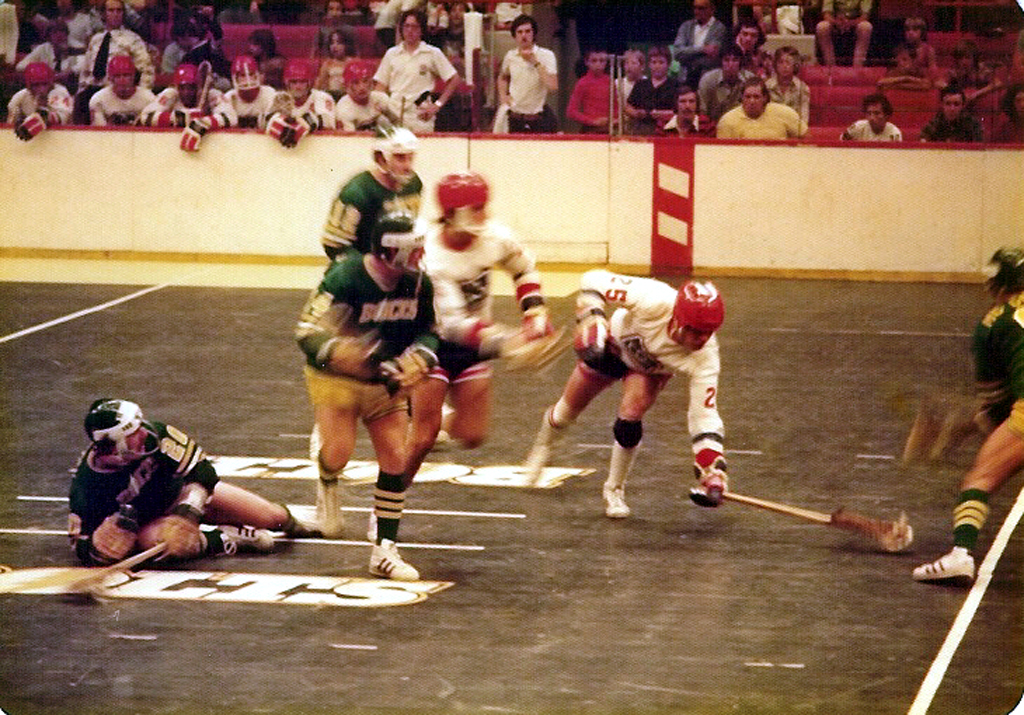
Game 5 September 12 1975 Montreal
Montreal had to win. Sounds simple, and the way they came out firing, it seemed to be, in the 13-5 win. Again, we are faced with that “sport circumstance” which is never carved in stone but happens with regularity, a little let up, a desperate effort rising to the occasion, at home and come up with a big effort.
This win moves Montreal to with one game of evening the series with game 7 at home. In this or any series, it is too early to even think that way and it is one game at a time, one shift at a time for Les Quebecois, with the Bolts now steering this thing home to wrap it up.
Jim Bishop…”This team deserves credit for it’s healthy attitude”. There were 7,878 fans in attendance at the Forum in Montreal, as the home team came out firing in the first and built up a 9-1 lead.
Bishop reminded his troops that Boston had outscored Montreal 21-12 in the second periods in this series. “Our backs were up against the wall” said John Davis. “We out hustled them tonight and were hungrier and won the loose ball battles, that’s the whole story. We have to play the same way down there next game”.
Bruce Roundpoint had a beef with Ivan Thompson who “Broke my nose, with his stick” said Roundpoint in the second game. Roundpoint went after Thompson in game five, but Thompson stayed away with the game being out of hand score wise and a lot on the line in game six in Boston.
These two teams really were developing a dislike for each other as teams do in a series. Roundpoint went on to add “He’s a real baby, as soon as I hit him he complained to the referee that he was wearing glasses”, then when we were in the penalty box he told me to keep my head up”.
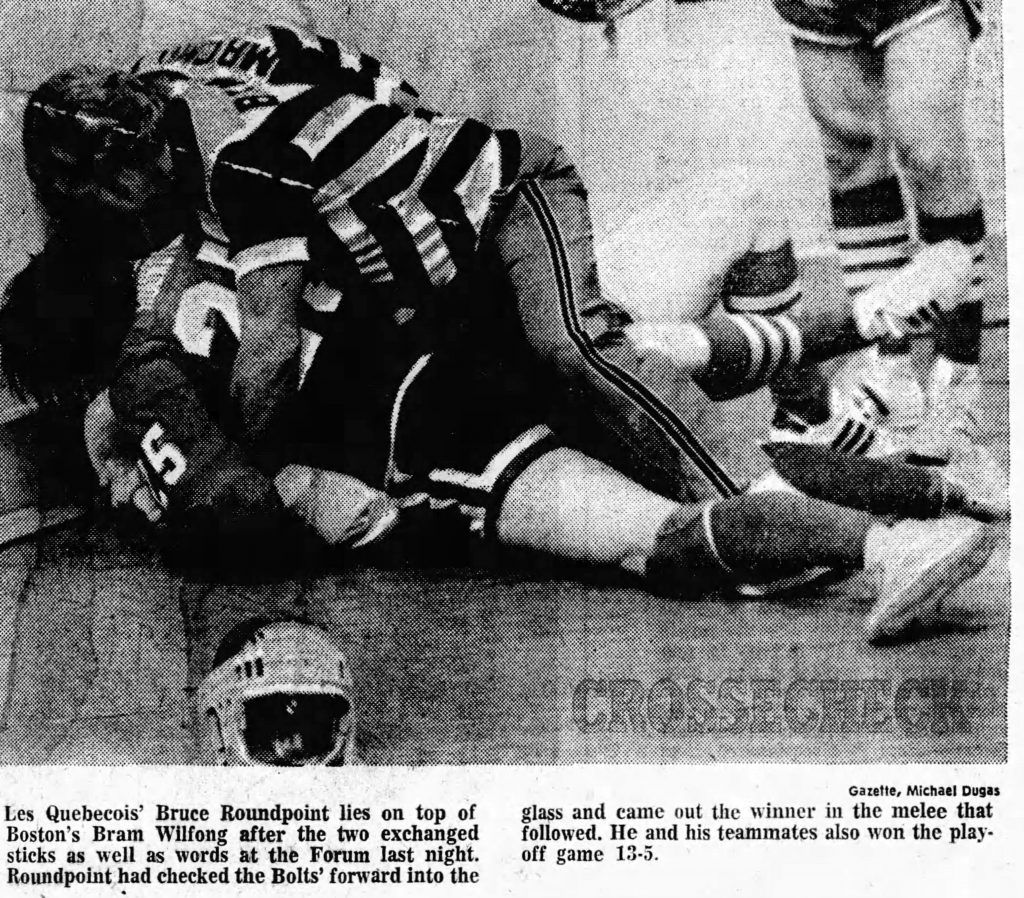
In the third period, Roundpoint broken nose and all, got into a battle with Bram Wilfong, who was not really a fighter, but stakes and tensions were high. “After I gave him a few shots, he didn’t like it and he wanted to wrestle” said Roundpoint, “so I wrestled him to the floor”.
Boston’s Ted Gernaey, who was a standout in the first four games in this series, could not finish the game as he was hit aggressively by Serge Loiselle in the second period. Ron Driscoll came off the bench and actually scored a goal which is a rarity in the game at this level. Loiselle was involved in two other fights in this game as well in this game, where tensions were high all evening.
Dave Tasker lead Montreal with 3 goals and 3 assists. Gerry Pinder, Johnny Davis with the winner and Wayne Finck each scored two. Singles to Sheehan, Litzenberger, Loiselle and Arena.
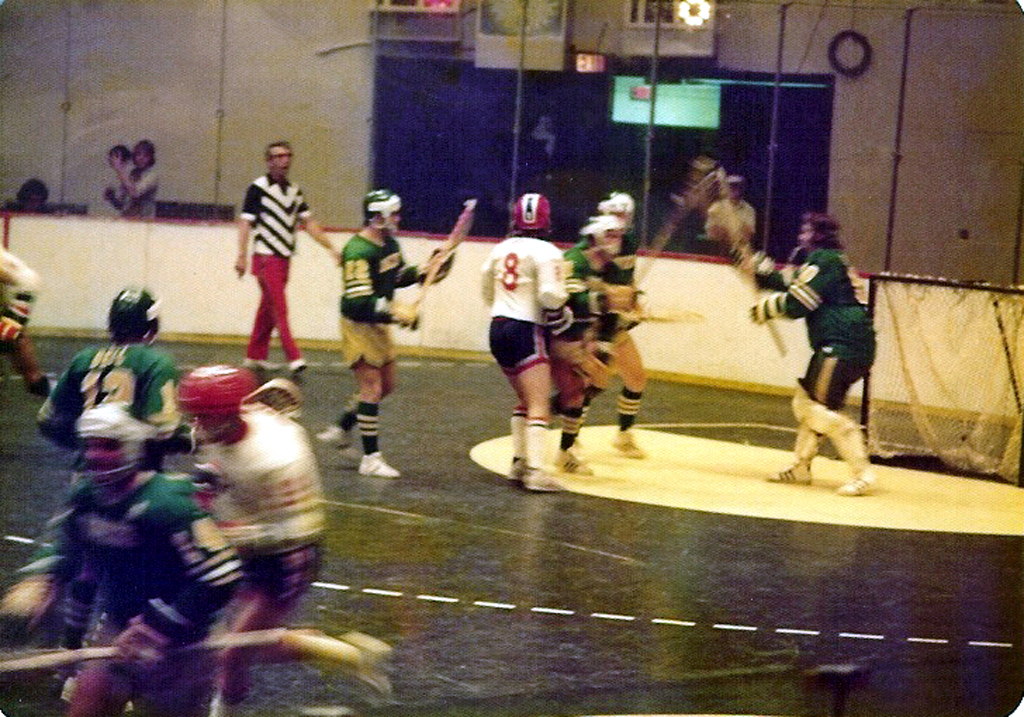
Game 6: September 14th, 1975 – Boston
On the bus, off the bus, is the way it feels in these series whether it is a bus or a plane. Pack, unpack, hotel in and out and then do it all over again. Time with the boys as young men was always fun. Those who were married of course would have a different set of circumstances to handle during these seasons.
We were in the prime of our lives, somewhat bulletproof, as we just played and thought nothing of it come game time.
Getting up in the mornings on the road or even at home after a game night was a bit tough. Games were almost stacked back to back with a day between and not always waking up did we feel like playing. Some food and movement, trainers table and tape and we were ready.
In game 6; Montreal 15, Boston 13, with Dale McKenzie scoring the winner for Montreal and it was back to Montreal for game seven.
Dave Evans: “She’s in the bag now!” feeling confident going home to the Forum for game 7 against a team they had defeated 6 out of 8 times during the season.
Jim Bishop, Montreal coach, applauded his teams most physical effort of the series “the Bolts were hearing footsteps tonight.” Boston was relying heavily on Ted Gernaey who was outstanding in game 6. The series was wearing him down
Playoffs were a different story as we all knew, so many moving parts. Quebec finishing against Long Island on the 14th of September sat and waited for the winner of the showdown.
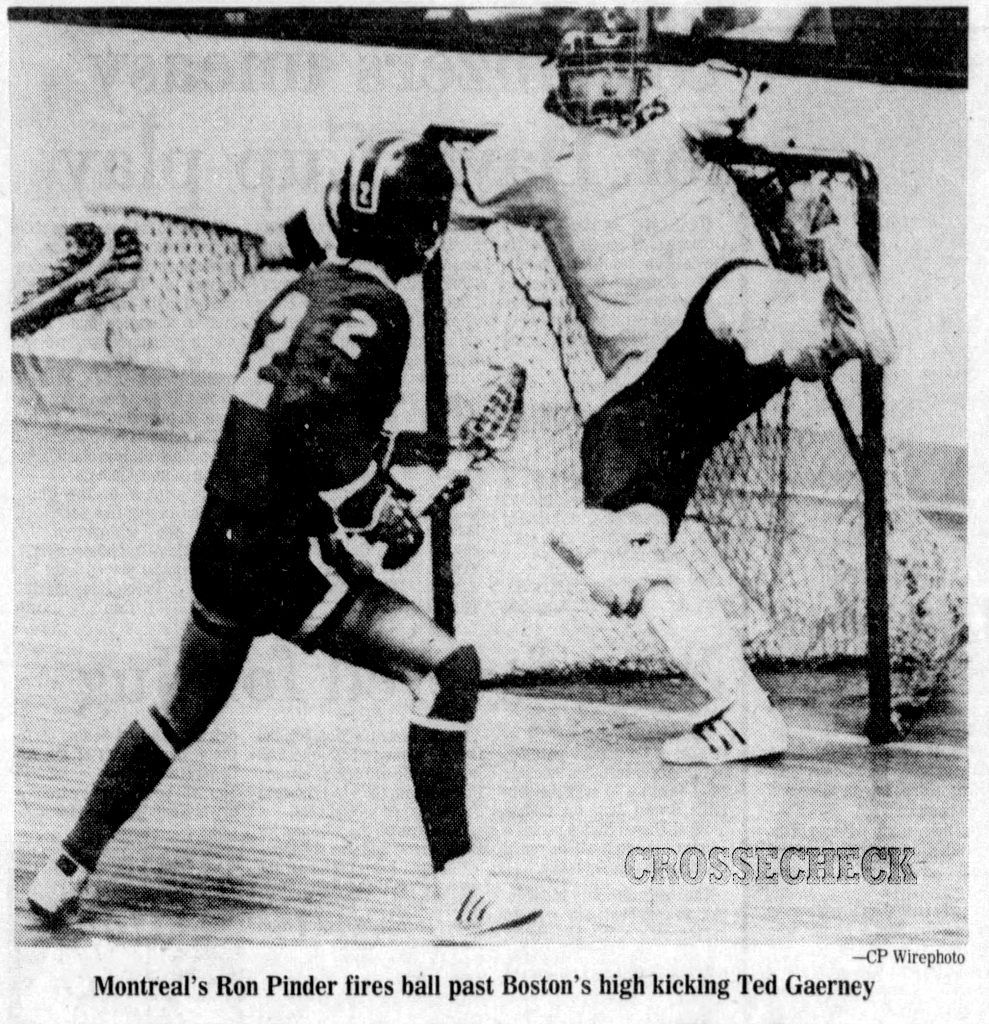
Game 7: September 16th, 1975 – Montreal
Game sevens are magical. For two whole days, before stomachs are in a knot and players, coaches, trainers and team officials are on edge. The mental aspect of coming back from 3-1 down is much different than having been up 3-1 then going to their barn for the deciding game.
All of that is out the window in reality in this one game showdown. Two very close teams with lots of lumps and bumps were about to square off before a crowd of 10,899 Montreal fans. Big game players step up in deciding games, elimination games and in this case both teams had them.
Montreal took control of this game in the 2nd period outscoring Boston 7-2.
Dave Litzenberger led the way scoring three with Ron Pinder and Nick Delmonico (all three Vancouver boys) had two each. Dave Tasker, also a former Vancouver Burrard, John Davis, Bill Sheehan, Bill Squire, Dale MacKenzie, Gord Floyd and Ross Jones getting singles in this truly team effort, winning the hard-fought series 4-3.
Ernie Mitchell was in goal for les Quebecois and earned best defensive player honours in the game with Bishop saying, “That’s the best second period we’ve had all year. We played pretty well in the first and third, but Ernie was the difference in the second.”
Mitchell left the game late in the third period, when a shot from Boston’s Stan Cox broke through Mitchells mask and shut his left eye. This made it doubtful Mitchell could start the series against Quebec in two nights.
Series C: Montreal Quebecois vs Quebec Caribous – NLL Final - Battle of Quebec

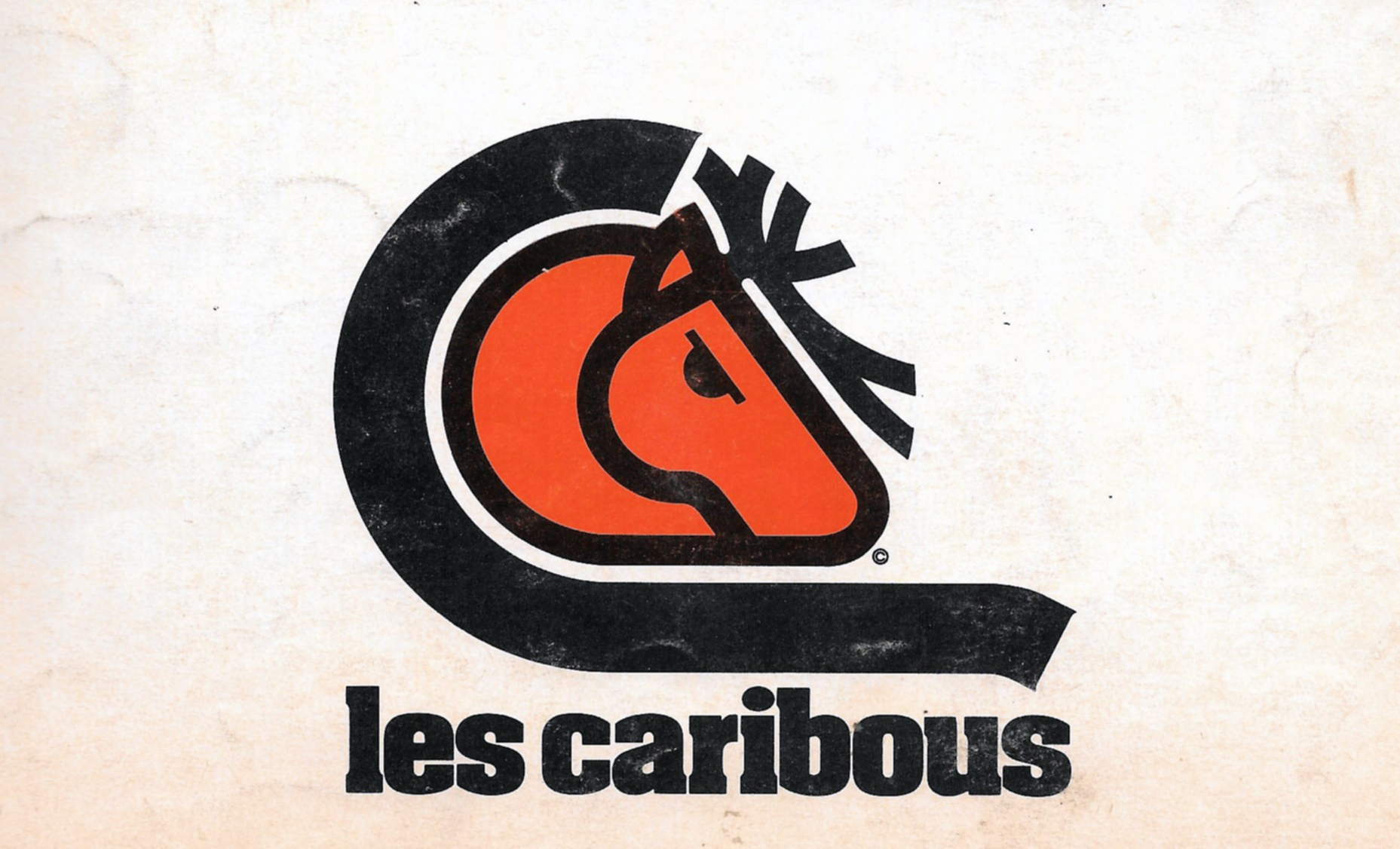
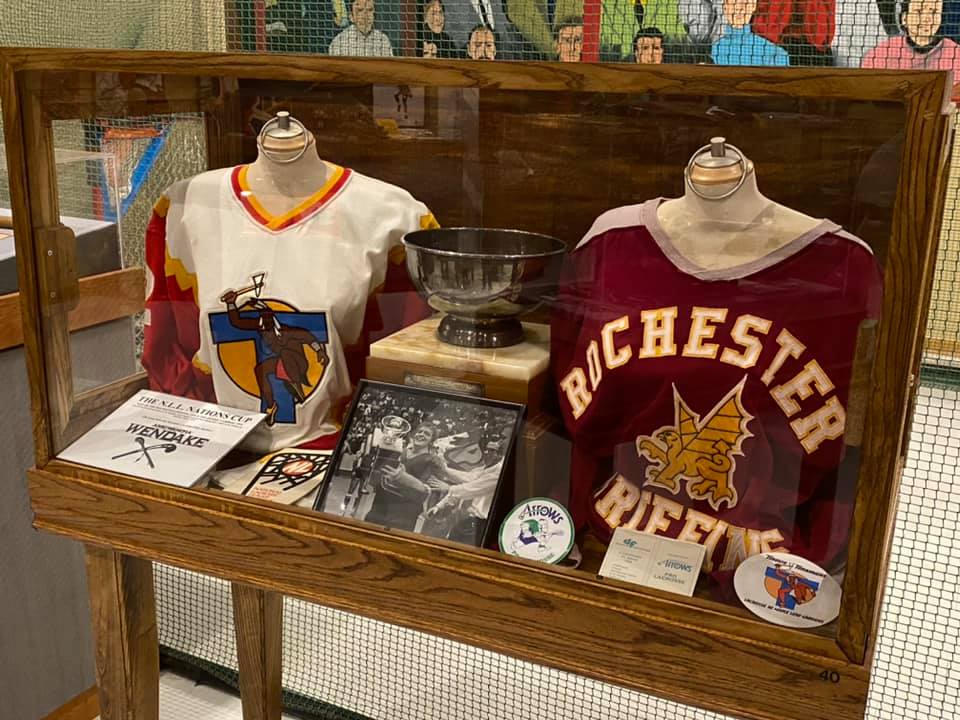
Photo courtesy of the Ontario Lacrosse Hall Of Fame
The Battle of Quebec was written about in Sports Illustrated as “A Provincial Affair”.
Indeed, it was. There wasn’t much time between the first round and the final series, as Montreal defeated Boston on a Tuesday the 14th and the final began on Thursday 16th. Les Caribous had won their first rounder on the 14th so a couple of extra days to heal the wounds from Long Island.
This was in fact a big deal in Quebec sport, creating lots of interest. Much was written in the French language papers none of which we could read and understand.
Quebec City Caribous had played the Montreal Quebecois ten times during the regular season, losing 6 and winning 4, and being outscored 131-120, so like other team vs team comparisons fairly close with only a goal a game difference when the math is done.
Most, if not all players in this National Lacrosse League, very much appreciated the fact that we played in some historic buildings. Maple Leaf Gardens, Boston Garden, Philadelphia Spectrum while not as old was at the time the home of back to back Stanley Cup Champion Flyers. The Capital Centre where the Maryland Arrows played had teams use the basketball dressing rooms, which was quite funny. Everything was built to basketball seven foot standards so benches, toilets, showers made us all feel like “little people” as our feet dangled from everywhere when sitting. Shower taps were at eye level or higher making for a waterfall type shower.
This final would offer two more sporting shrines in the Montreal Forum and the Quebec Colisee. It was my feeling that fans in Quebec or people in general saw for years a Beliveau star for the Quebec Aces and Lafleur star for the Quebec Remparts then move off to the “bid city” in Montreal to play.
Quebec had their marvelous, world famous International Pee Wee hockey tournament annually and Le Carnival each winter, WHA vs NHL, but as far as professional direct competition this one had some meat on the bone and as this series progressed, interest was building.
Game#1: September 18th, 1975 - Montreal
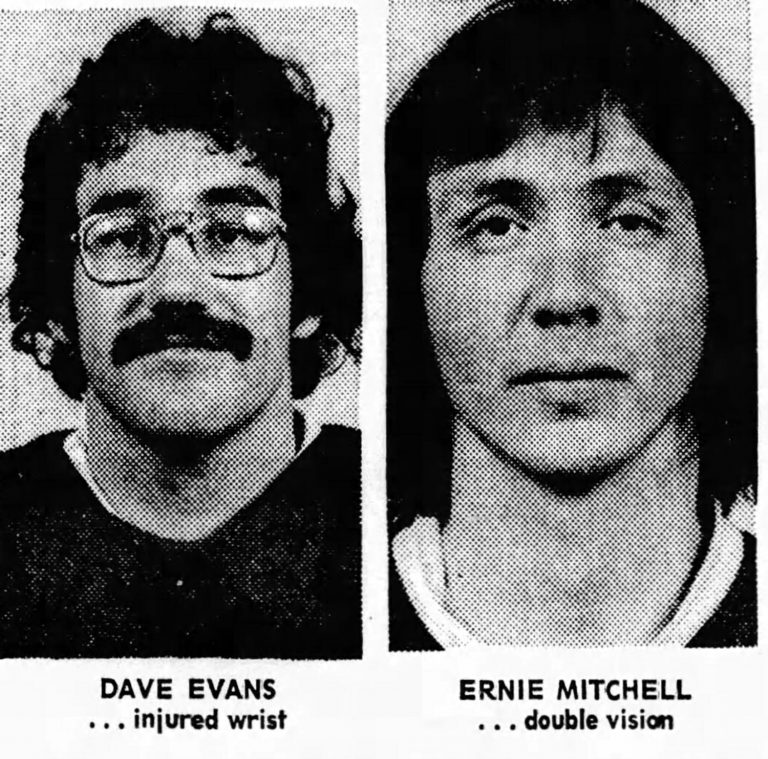
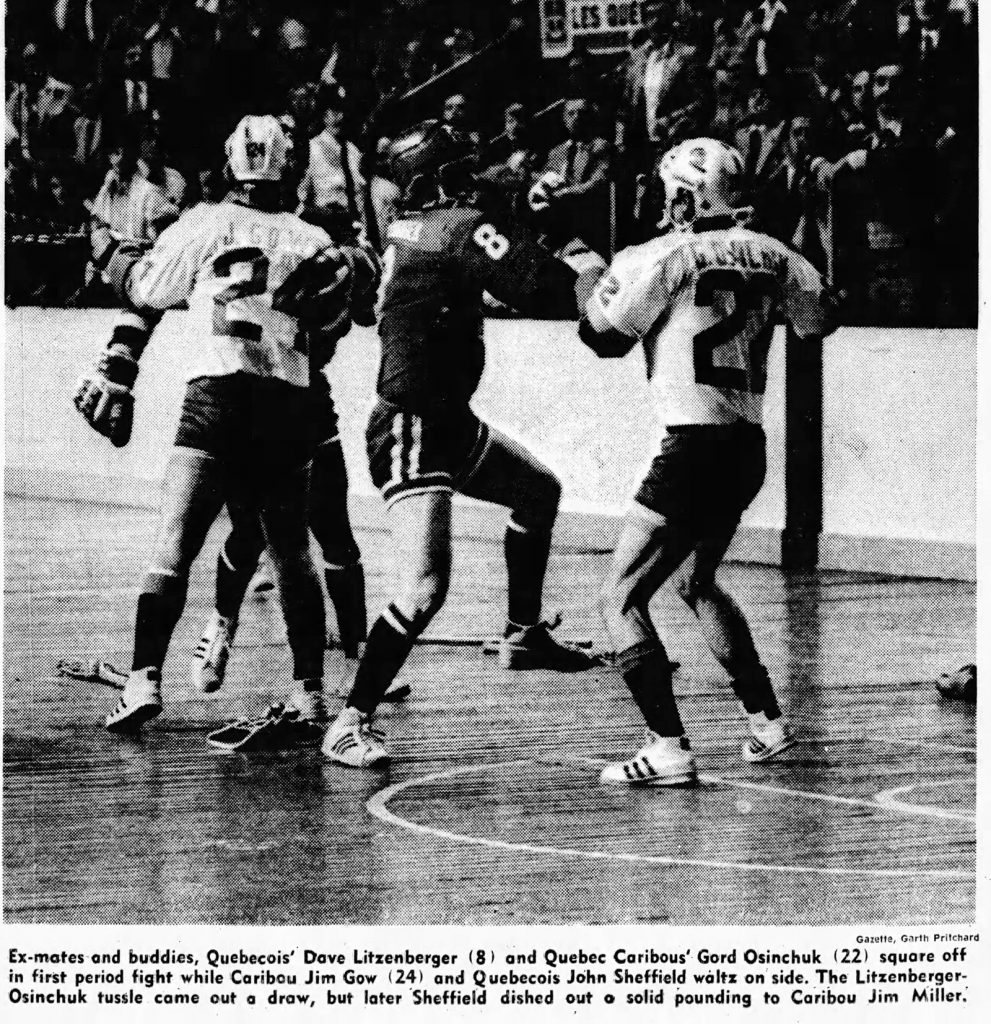
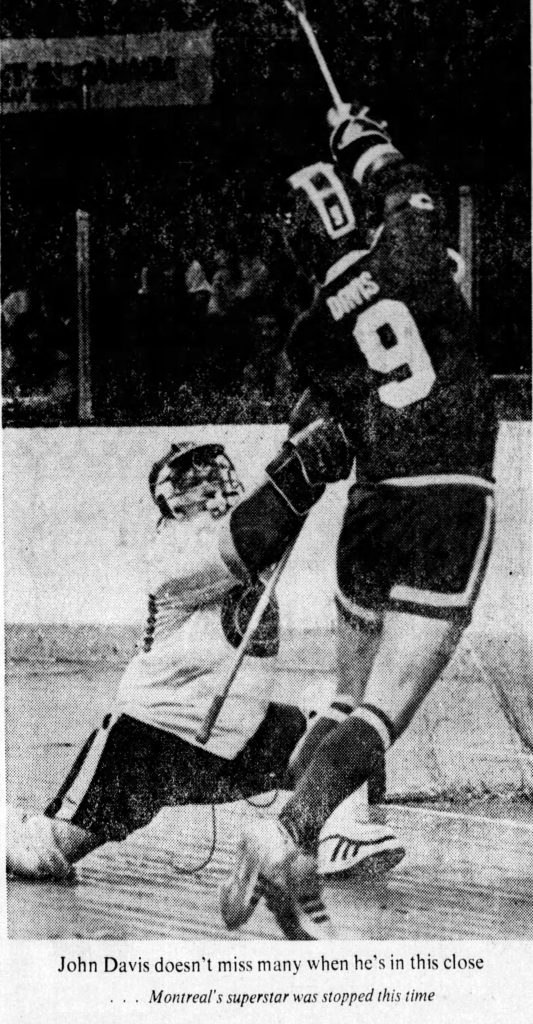
First game in this series was a beauty. Tied 10-10 after regulation. A back and forth contest with both teams knowing each other well. The Montreal goaltending situation was in flux with Dave Evans and Ernie Mitchell both injured. Keith Todman was a league decision as he played for Maryland during the regular season. Gary Van Schagen from Long Island was brought in to back up Todman.
Dave Evans was out since he injured his hand punching a wall in the dressing room after going down 3-1 in the Boston series which Bish probably never found out the truth about. Mitchell was still suffering the effects of the shot in game seven from Stan Cox which closed his left eye.
Keith Todman had a strong game as Caribous shooters would test him 43 times, while Montreal had 59 shots on Larry Smeltzer, who was his usual wall in the net and in the zone.
After one period, teams were tied 2-2 and Montreal led 6-5 going into the third period. Quebec rallied to take the lead late in the game and Ron Pinder scored with 34 seconds remaining in the 3rd to tie the game and send it into overtime before the 6.086 fans.
Three fighting majors to each club trying to set a tone were part of 56 minutes in penalties called by referees Bill Dicks and Jack Leitch.
When goals by Bruce Murdock and Terry Sanderson (with the winner), 6 seconds apart in the 10 minute overtime period snapped the 10-10 tie, Quebec edged Montreal 12-11 for their first ever win in the Forum, after losing each regular season game there over two seasons and 9 consecutive games. In 1974, Quebec was Syracuse and lost all 4 games in the Forum.
Murdock, Durante and Differ each scored three goals, Sanderson Higgs and Travis Cook adding singles. Montreal goals were scored by Tasker with 3, Ron Pinder adding 2 and Litzenberger, Davis, Loiselle, Arena, Floyd and Gerry Pinder adding others.
Quebec drew first blood as the team remained on a high after defeating Long Island. In that series and this one facing two of the games legendary coaches Morley Kells and Jim Bishop, Medo Martinello was strategizing each series, each game on how to manage this challenge.
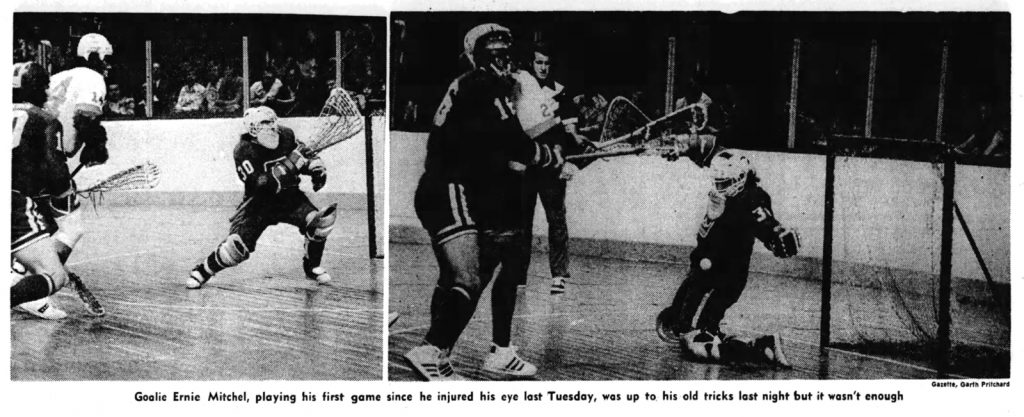
Game 2: September 21st, 1975 – Montreal
Having a couple of days off in Montreal, practicing in the Forum and wandering the streets during the beautiful autumn days was a special time. One that almost took us out of the series mentality and gave us a chance in the two days between games to enjoy the moment. Montreal is a wonderful city and as a team we were in the moment as we wandered the halls of the hotel, visiting teammates or out on the streets taking in the city.
Montreal dug in for game two. 7,484 fans supported their Quebecois as this battle got tough. Every loose ball was do or die; game control early was gained by Montreal. In lacrosse, power plays were deadly especially with the gunners on both sides, so penalty calls could well be game changing. Ernie Mitchell returned to play goal.
Technically, slashing was a penalty, but in this game and in this series, officials stretched the rules and actively looked for even up opportunities to keep control of a very volatile and violent atmosphere on the floor.
After two periods Montreal held an 8-6 lead in this chess match environment. They had out scored Quebec 4-2 in the second period.
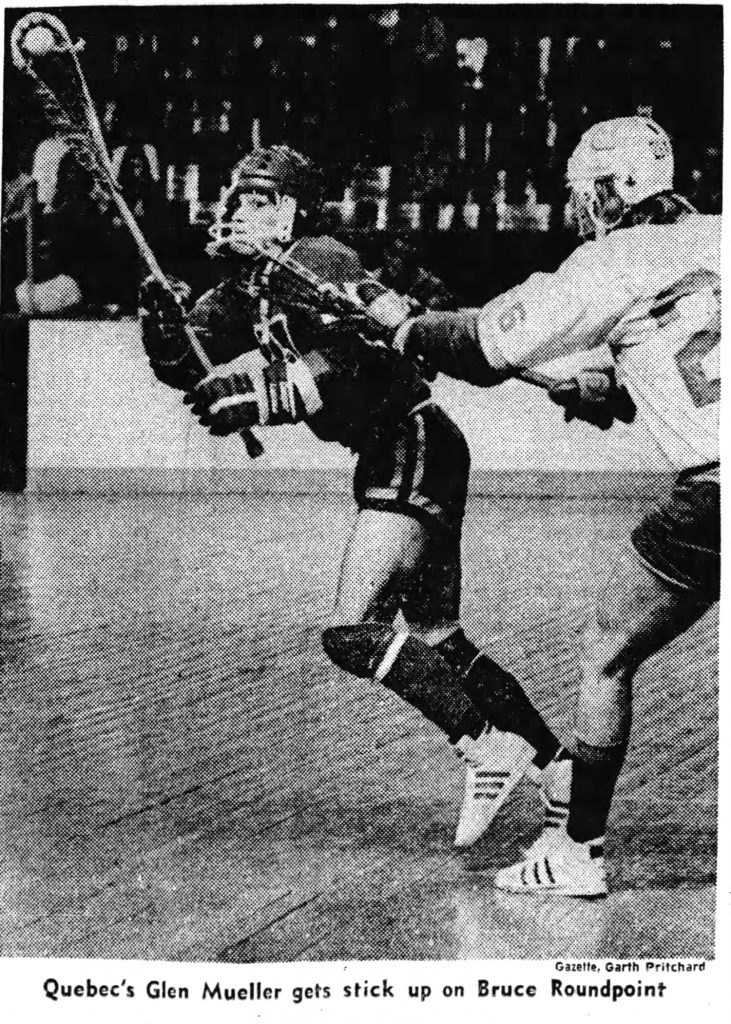
Thirteen minutes were gone in the third with the score Montreal 9 – Quebec 7, when les Caribous rallies with 4 goals in the final 6 minutes of the game.
Murray Cawker (big game guy) scored to tie the game at 17:44 of the 3rd and Brian Evans scored his second of the night just seven seconds later for the winner. Jim Higgs added an insurance marker at 18:20 and Quebec was up 2-0 going home.
Travis Cook, Pat Differ and Glen Mueller had two each, Jim Miller the other.
Ron Pinder, John Davis scored twice for Montreal with Ross Jones, Dave Tasker, Bruce Roundpoint, Bill Nunn and Gord Floyd singles.
In this game, Quebec’s Terry Sanderson and Montreal’s Ross Jones squared off with Jones being almost a foot taller. Sanderson was a foundation piece out of Syracuse and Quebec team. He has come from nowhere really playing Junior C lacrosse in Orangeville, Ontario and being drafted late by Syracuse.
The lacrosse world would learn who Terry Sanderson was in short order, as he was a complete player who could fight with the best of them, even though he was small in stature.
Fearless, he put a pretty good beating on Jones, who must have been caught up in the moment in frustration, as he was a goal scorer and not really a fighter. This gave our team some wind in our sails as we sailed back on the bus to Quebec.
With the series shifting to Quebec and Les Caribous up two games, the fans in Quebec were ready to welcome their team home for the next two.
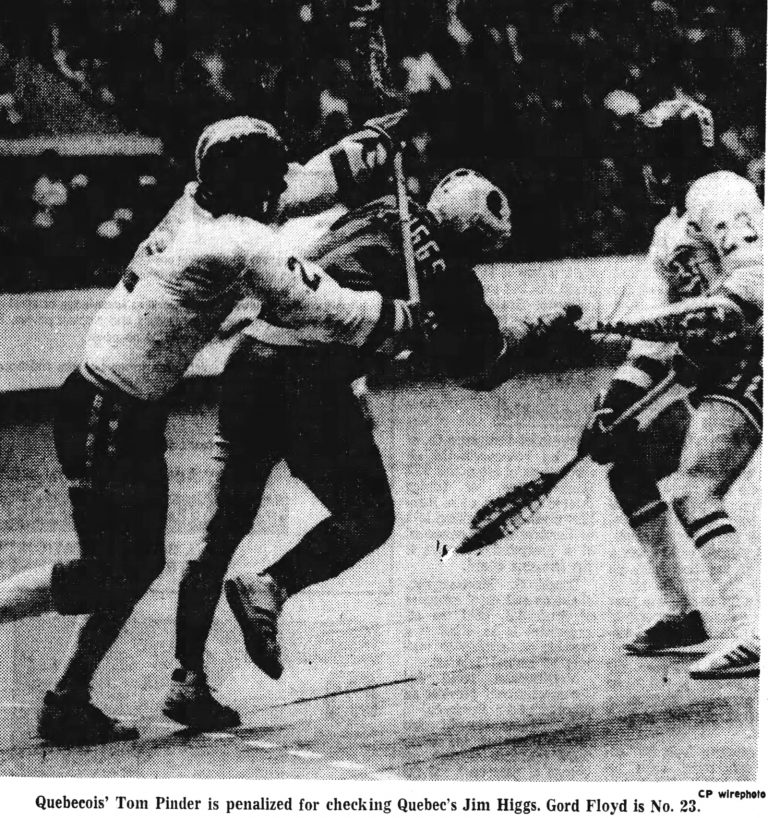
Game 3: September 23rd, 1975 – Quebec City
Le Colisee was humming for this one. Referees Gerry Ravery and Charlie Phillips had their hands full, calling 60 minutes in penalties, from the 260 that actually happened.
There were 10,718 people crammed into the 10,500 seats on this night. In the very first game played at Les Caribous home opener 14,000 plus jammed into the rink to see what lacrosse was all about.
Both teams were going at each other in this pivotal game. Travis Cook with his booming shot scored four goals. Opposing goalies would really hope he missed the net as in those days, goalie gear was not what it is today and during the playoffs. Cook tied Johnny Davis with 23 markers to lead all scorers.
A five goal third period rally was the decider in this tight game. Cook scoring 3 of his 4 during that time in the 10-8 Quebec win.
Pat Differ and Windsor’s John MacDonald scored two each, Bruce Murdock and tough Jim Miller the others.
John Davis led Montreal with three, Dave Litzenberger getting a pair and Roundpoint, Arena and MacKenzie the others.
Caribous led 4-3 after the first but Montreal outscored Quebec 4-1 in the second. Cook scored what proved to be the winner at 12:26 of the third.
3-0 and Quebec faced that “funny” time again being one win away from the Championship knowing the fourth win is the most elusive.
Tensions were high as could be expected on the Montreal side. Are we playing more than just the Caribous? Montreal coach had a team meeting with his players and basically said they needed to rise above what was felt as “some bad calls being made at crucial times during this series”.
“I don’t want to blame the officials, I don’t want to use that as an alibi, but the feeling on their side that was on the floor for games in Quebec City, Montreal was being cheated on the use of the 30 second clock as to when it would start upon Quebec gaining possession. Bishop’s feeling was that a couple of referees had personal beefs with him and his team was suffering because of it. “If we get beat by Quebec fair and square then fine, but not because of refereeing!”
This all was in the “air” between game three and four. I think it is fair to say that the Caribous played an aggressive defensive style protecting the space in front of goaltenders Smeltzer and Rick Palla. There were lots of hacks and slashes at both ends. Hacksaw Russ George lead the way for our defensive stands everytime the ball came down the floor, numbers were called out and punishment was a certainty.
Bishop claimed that four Long Island players had broken hands because of these tactics, while Montreal players broke their hands punching walls.
“We can’t win four in a row in one night, but we can win one in a row four times.” Said Bishop.
John Davis, 31yr old lacrosse legend, “had a good feeling” remembering back fourteen years when in Peterborough, they trailed Brampton 3-0 in their playoff series in sweaty Ontario, when Peterborough won that fourth game and the next three and went all the way. Davis also went on to say that they as a team needed to “get to” Larry Smeltzer and added he was “playing over his head”.
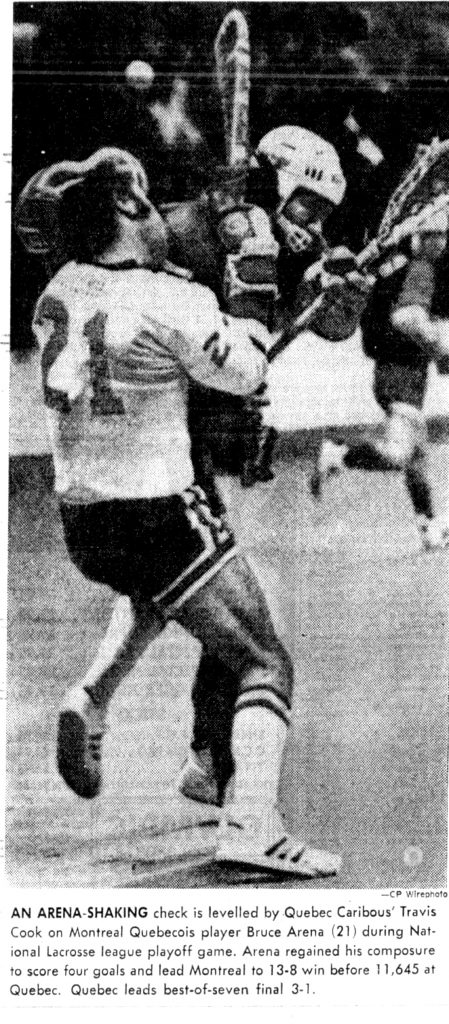
Game 4: September 25th, 1975 – Quebec City
The Quebec Caribous knew all too well that this Montreal bunch was a very good team and that the fragile momentum pendulum could swing the other way in a heartbeat. Preparing for game four, we were loose, but also aware that this Quebecois team had come back from 3-1 down to win the Boston series, winning three in a row and that is just how this league was. There were no easy games especially with the championship on the line.
On this night 11,645 flag waving, vocal, passionate lacrosse fans jammed into the building that Beliveau built, to see Les Caribous defeat Montreal and win a professional championship by beating their archrivals.
The proud and determined Montreal Quebecois had other plans and were up for the challenge riding John Davis’ enthusiasm and leadership to the floor and took the game to Quebec all night, winning 13-8. Montreal led 6-4 after the first period, as Quebec was running in sand, as can happen when you need to win that fourth game.
Bruce Arena was flying and scored 4 goals. Bill Sheehan (the winner) and Dave Tasker scored two each, while John McKenna, big John Sheffield, Bruce Roundpoint, Ron Pinder and Wayne Finck added other goals.
This was Montreal’s best game of the series and it had to be. Bruce Murdock and Dave Durante scored two each for Quebec. Travis Cook, Glen Mueller, Brian Evans and Gord Osinchuk completed the not enough scoring for les Caribous.
It was on now. Going back for a Saturday night game in the Forum was where we were all headed and that was a hill to climb for Quebec.
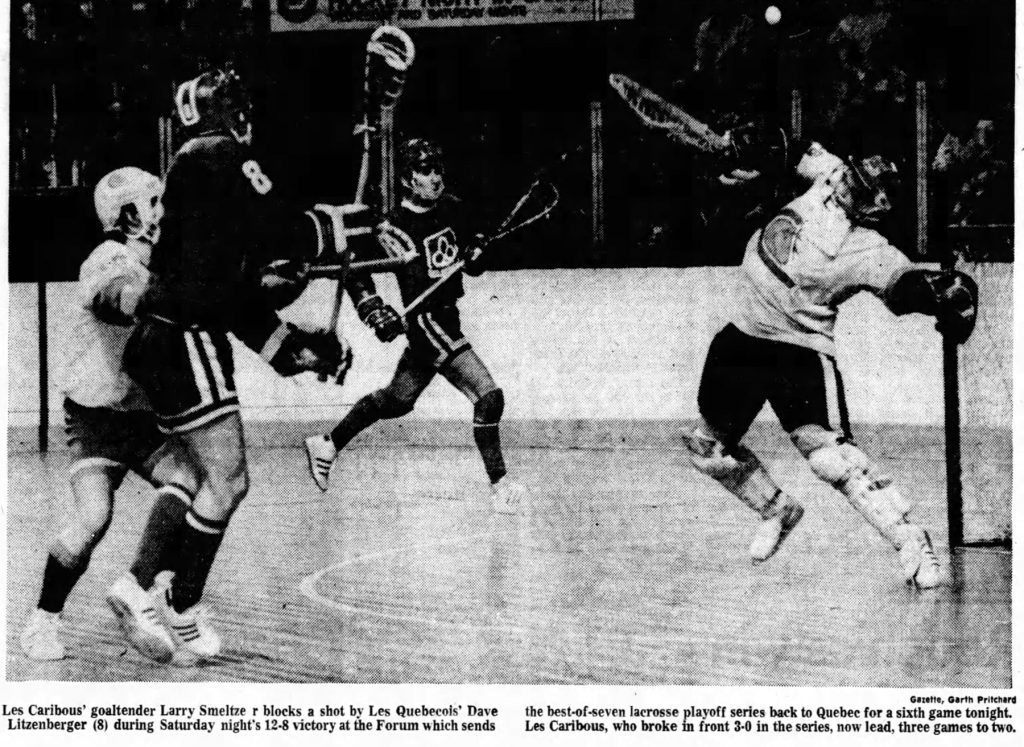
Game 5: September 27th, 1975 – Montreal
The bus ride from Quebec City to Montreal, we had were made many times, but never with this much on the line. One win away from a championship ring and one opportunity missed before a passionate, friendly home crowd.
It was fair to say that the crowds in Montreal seemed to have a higher pedigree behavior wise. They were used to winning. They also were knowledgeable regarding what it took to win a best of seven series. Something more to it than just winning four games.
Quebec Caribous were once again on the edge of series victory, but this Montreal team did not seem to mind coming from behind, as we know. The crowd was 9,105 and sounded like more. The blood red seats filled up and the ghosts of all those Canadien teams seemed to be hovering over us, as we stood for the anthem.
We were visitors here and felt that way. John Davis took control scoring 3 goals and assisting on two more in the 12-8 Quebecois win to bring the series to 3-2.
Again Litzenberger (with the winner) and Sheehan scoring two each and Dale Mackenzie, Sheffield, Arena, McKenna and Serge Loiselle rounding out the scoring.
Quebec had Brian Evans, John Macdonald and Gord Osinchuck scoring two each, with one each coming from Murray Cawker and Dave Durante.
Period scores were 3-3, 7-5 and we were back in Quebec, two long nights later.

Game 6: September 29th, 1975 – Quebec
Game night came soon enough. Players found themselves fidgety, going through rituals before the game. Personally, for the last three games, I had been having my foot frozen and was numb from pretty much the knee down, which was a funny feeling trying to run and feeling like I was landing on my knee.
I told Medo, standing beside Taffy, who was holding my leg still, that I would play, give it a go each night, but could not really run well, didn’t want to not play. My deep heel bruise would not allow me to walk at all without crutches, but once frozen I could not feel a thing.
During my shifts, I concentrated on getting loose balls and being there in body, but scrambled to be effective and came off the floor most times after the face off and possession was gained either way. It was an awful feeling.
Putting that towel from Taffy in my mouth, while the doctor with the horse needle inserted it into my foot a couple of times each game. The things we do when young.
Quebec Colisee was jammed again for what Jim Bishop conceded was les Caribous best game of the season!
Quebec press stated “WHAT A RETURN SINCE THE EXTINCTION OF THE MONTAGNARDS FROM QUEBEC MORE THAN A CENTURY AGO! As defeating Montreal was a big deal. (Not being a student of Quebec history, I don’t know what that means.)
Larry Smeltzer “the Mooner” was the clear MVP and really was a tower of strength the entire playoff run. Smeltzer also added 25 assists in the playoff to be 8th in all playoff scoring! Caribous acrobatic goaltending tandem was good as any, at anytime.
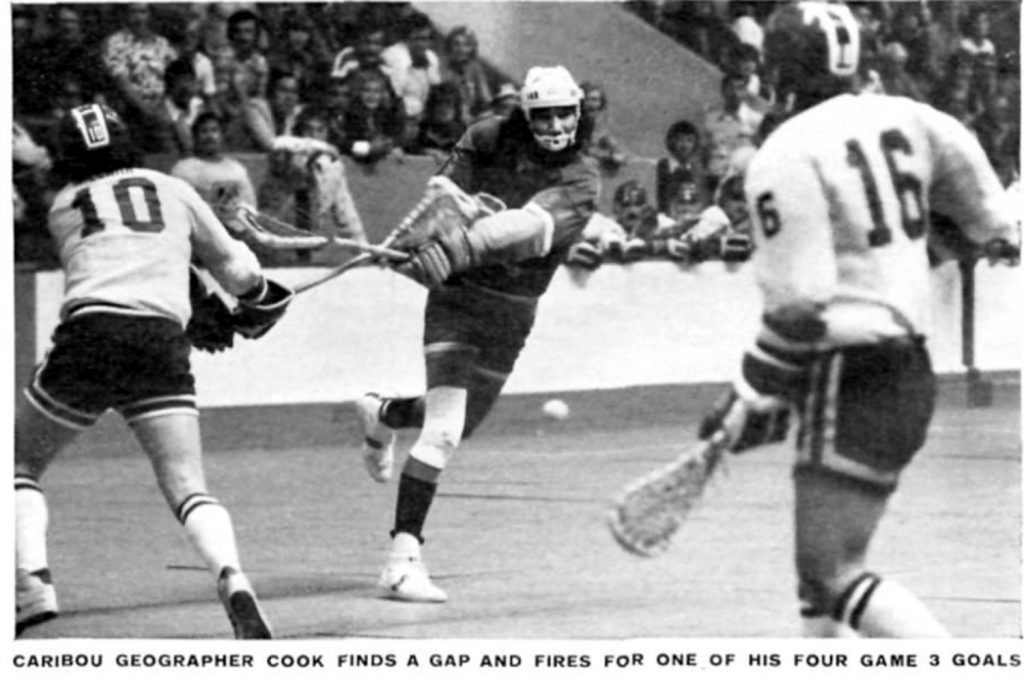
“To the veterans who literally emptied themselves with their last energies, including Differ and George who have played “frozen” and young Caribous Durante, Cawker, Evans and Sanderson, Cook et al. have completed their mission proudly” the Quebec papers said.
This game began with Durante scoring early for Quebec, which is always, even in high scoring lacrosse, a big boost. In short order Sanderson and Osinchuk followed to make it 3-0. Durante was a constant threat the entire year and really did perform at the #1 pick.
Osinchuck scored three first period goals which set the tone. It was usually the case that Ozzy set the tone with his fists. Montreal scored three goals in the last two minutes of the game to make the score seem closer than the game actually was, to the delight of the Caribous fans.
It was Ozzy’s 3 goals and two each from Cawker, Durante, Cook, Sanderson and Brian Wilson. Singles to Higgs, Murdock, Evans and fittingly, hard working Murray Cawker, with the game winner, who also threw in 3 assists as did John MacDonald. Smeltzer faced 60 shots and discouraged Montreal shooters.
Montreal was led by once again John Davis with 3, Ken Winzoski 2, and one each from Litzenberger, Ron Pinder, Jones, Tasker and Arena. Litzenberger’s goal was the last NLL goal.
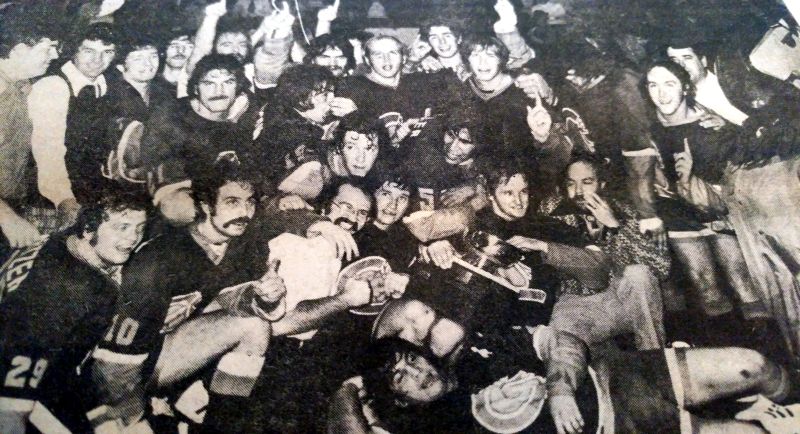
This ended the playoff season and in fact was the last game played in the National Lacrosse League. The two legendary coaches Kells and Bishop saw the end of their dream.
The celebration began and players sat in their stalls in the dressing room under the stands in le Colisee, drained and not quite yet realizing in some cases, that it was time to party. We were too tired to party for a short moment, as what just occurred was still sinking in.
Even though there was lots of noise, after we had done the traditional lap around the arena with the trophy held high. Now in the confines of our room we were at inward peace. Hard to explain other than to say we had climbed the mountain and didn’t want to think in that moment about climbing another one.



